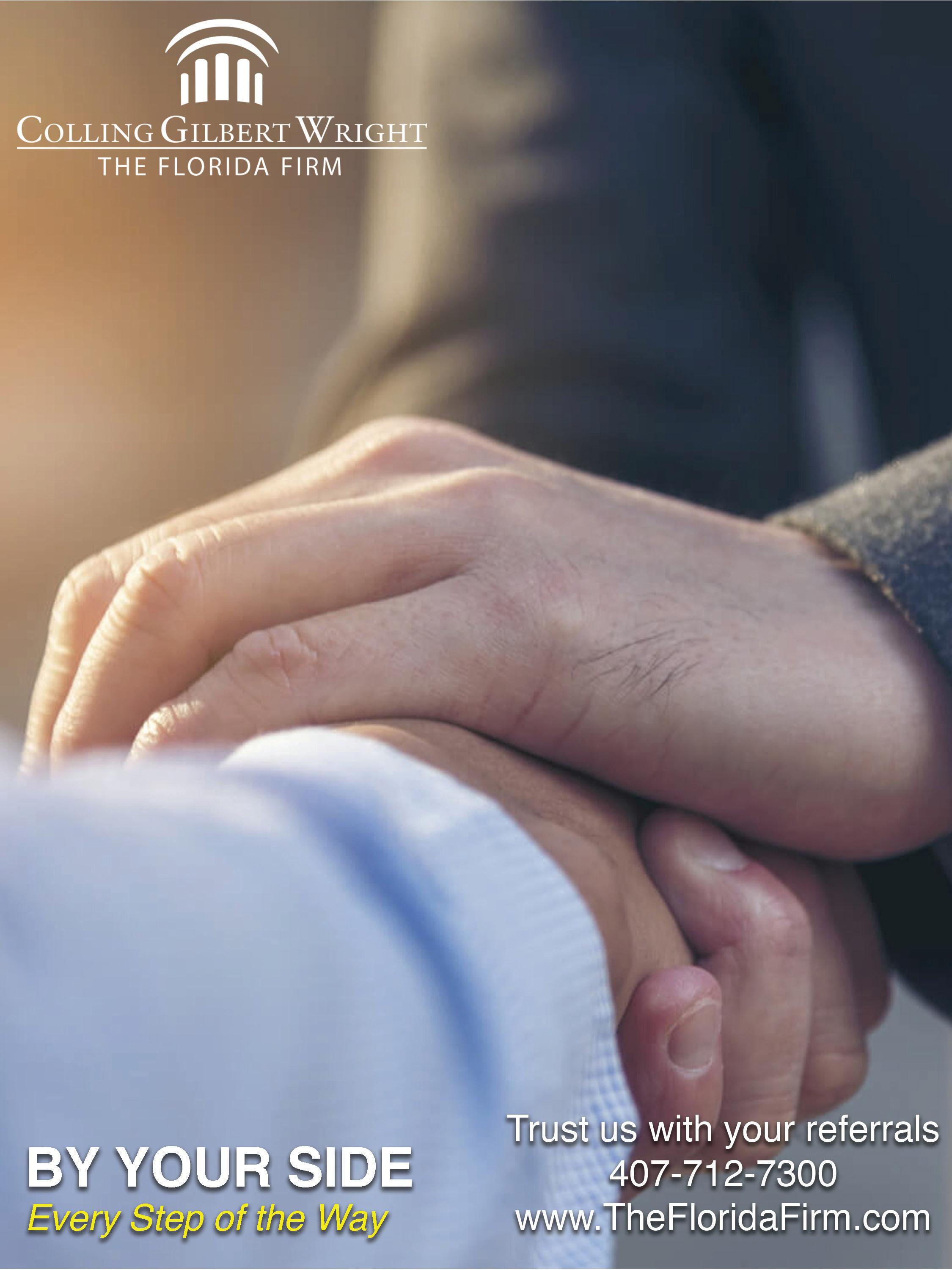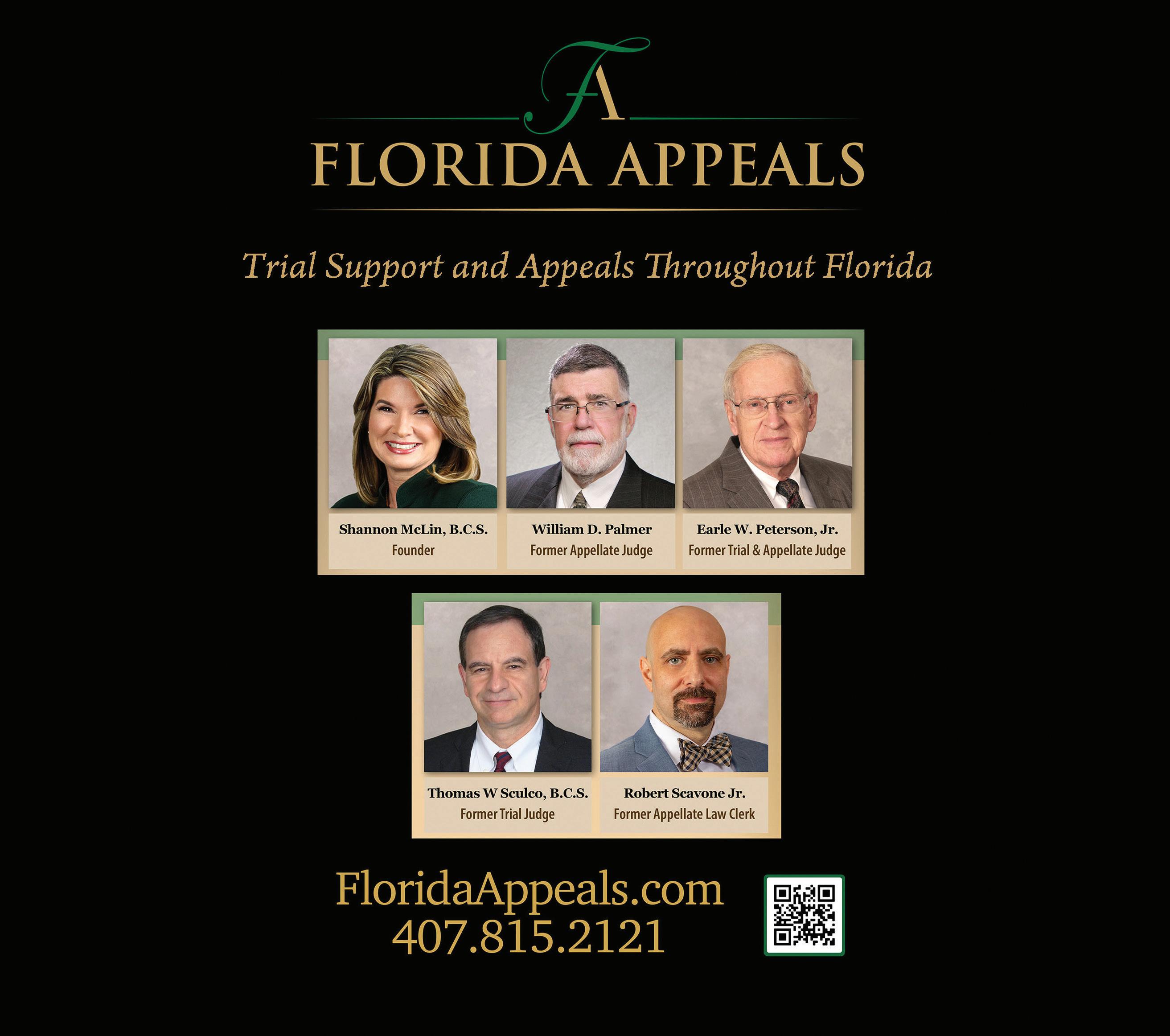FOUND IN TRANSLATION
Hon. Luis Calderon on tearing down the language barrier

A BRAND NEW YOU
Nequosha Anderson and Sean MendezCaitlin on branding your practice
A PUBLICATION OF
A GAME CHANGER
Jessica Valentin on Florida’s new Limited Appearance Rule

Hon. Luis Calderon on tearing down the language barrier

Nequosha Anderson and Sean MendezCaitlin on branding your practice
A PUBLICATION OF
Jessica Valentin on Florida’s new Limited Appearance Rule

VERITEXT IS READY TO ASSIST YOU WITH YOUR NEXT VERITEXT IS READY TO ASSIST YOU WITH YOUR NEXT DEPOSITION, ARBITRATION, HEARING, OR TRIAL! DEPOSITION, ARBITRATION, HEARING, OR TRIAL!

VERITEXT IS PROUD TO BE A SPONSOR OF
POWERFUL TECHN0LOGIES. TRUSTED SERVICE. SECURE SOLUTIONS.
POWERFUL TECHN0LOGIES. TRUSTED SERVICE. SECURE SOLUTIONS.
Veritext offers seamless deposition coverage, with more than 60 locations nationwide, and leading-edge technologies that keep you connected.
• Court Reporting
• Videography
• Exhibit Management Solutions
• Videoconferencing
• Records
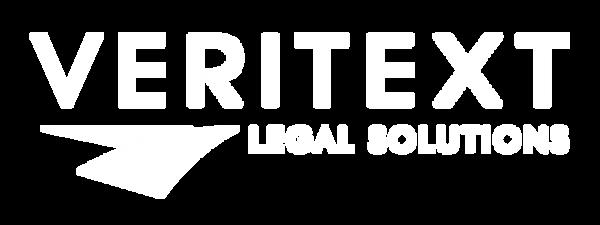
• AI Generated Transcript Summaries
• Hybrid Depositions
• Document Repositories
• Data Security / Privacy
• Subpoena Services CONTACT US
Hernandez — lhernandez@veritext.com





Navigating
Arti Ajit Hirani, Esq.
New
The Honorable Tiffany Moore Russell, Esq.
Nequosha Anderson, Esq. & Sean Mendez-Catlin, Esq.
Ritcy Canelon, Esq.
Alena V. Baker, Esq.
The Honorable Luis F. Calderon
Question
Catherine Moussa, Esq.
Magazine: 10th of month prior to publication
eEdition: 20th of month prior to distribution
Copy: Six weeks prior to publication If
Know
Robert W. Borr, Esq.
Mexcye
Florida’s
Jessica
880 N. Orange Ave., Orlando, FL 32801
Phone (407) 422-4551 Fax (321) 430-1558 orangecountybar.org
Legal Aid Society (407) 841-8310
Citizen Dispute (407) 423-5732
Family Law Mediation (407) 423-5732
Lawyer Referral Service (407) 422-4537
Foreclosure Mediation (407) 515-4330
Young Lawyers Section (407) 422-4551
NOVEMBER 2024 VOL.92 NO.9
Editor Kate T. Hollis
Associate Editors
Christine Wasula Tina Leger
Columnists
Alena V. Baker
Sean Mendez-Caitlin
Officers
Arti Ajit Hirani, President
Keshara Cowans, President-Elect
Lisa Gong Guerrero, Treasurer
Michael Barber, Secretary
Jacob Schumer, YLS President
Executive Council
Stephanie Alcalde
Kate T. Hollis
John M. Hunt
Bruce Mount
Jessica P. McGinnis
Alisia Adamson Profit
Rafael O. Rodriguez
C. Andrew Roy
Brandon M. Sapp
C. Todd Smith
Jennifer Smith Thomas
Jessica A. Travis
Executive Director
Candice Disorbo
Advertising & Sponsorship Manager Ursla Gallagher
Marketing & Communications Manager Reatha Cruz-Johnson
Design Em Agency, emagency.com


Thursday, January 16 at the Citrus Club
Start 2025 off right by taking this opportunity to connect with colleagues, network with new members, and informed about the latest developments in the legal community and around the bar.
RSVP by Monday, January 13, 2025
Ashley Velez ashleyv@ocbanet.org | orangecountybar.org/page/store RSVPs and cancellations will not be accepted after January 13, 2025.

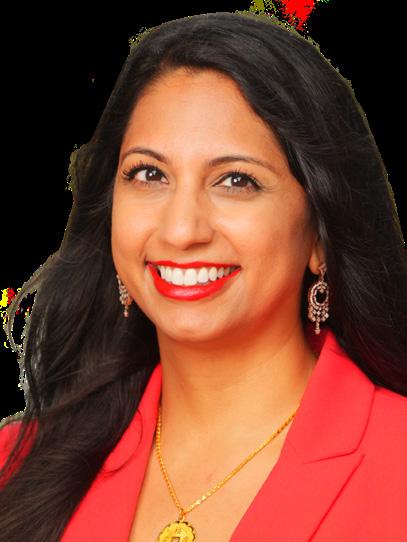
Dear Members,
As we find ourselves in an era of rapid transformation within the legal profession, driven largely by technological advancements, I want to take a moment to reassure you that the Orange County Bar Association is steadfast in our commitment to supporting you during this pivotal time. The integration of innovative tools, particularly artificial intelligence (AI), presents remarkable opportunities for enhancing our efficiency, improving client services, and streamlining case management processes.
The advent of AI and other technologies is not just a trend; it is a fundamental shift that is reshaping how we practice law. From automated research to advanced case analysis, these tools can significantly reduce the time spent on routine tasks, allowing us to focus more on strategic legal thinking and client interaction. Imagine being able to quickly analyze vast amounts of case law or draft complex legal documents with unprecedented speed and accuracy. The potential to improve client service and achieve better outcomes is substantial.
However, as we enthusiastically embrace these advancements, we must remain vigilant regarding the ethical considerations they entail. The recent ethical opinions issued by the Florida Bar regarding the use of AI serve as timely reminders of our obligation to uphold the highest professional standards. According to the Florida Bar’s guidelines on AI usage, attorneys must ensure that they understand the limitations and functionality of these tools, verifying the accuracy and reliability of the information generated. Importantly, lawyers must remain responsible for the legal work
they produce, even when AI tools are employed. This includes maintaining competency in the subject matter and not relying solely on technology for legal analysis.
To aid you in navigating this evolving legal landscape, the Orange County Bar Association has proactively established a Technology Committee. This committee is dedicated to providing essential resources and guidelines for effectively integrating technology into your practice. Through this initiative, we aim to empower our members by offering informative seminars, practical tools, and best practices that align with our ethical obligations. We will also address the specific ethical guidelines adopted by the Florida Bar regarding generative AI, which emphasize the importance of transparency with clients about the use of these technologies in their cases.
Whether you are a seasoned attorney or just starting your career, the resources provided by the Technology Committee will be invaluable in helping you adapt to these changes. We are planning regular workshops and training sessions aimed at equipping you with the necessary skills to leverage these technologies effectively. These sessions will cover not only the operational aspects of AI but also the ethical frameworks that govern their use.
In our pursuit of innovation, we must not lose sight of the core principles that define our profession, particularly client confidentiality and the protection of sensitive information. As we incorporate new technologies into our workflows, it is crucial to implement robust security measures to safeguard client data. The Florida Bar’s ethical guidelines underscore that lawyers must exercise caution
when using AI, ensuring that any client information remains confidential and secure. Understanding the limitations of AI systems is essential; while they can enhance our capabilities, they are not infallible. It is our duty to verify the outputs of these technologies and ensure that we are delivering the highest quality of service to our clients.
I encourage each of you to actively engage with the Technology Committee and take full advantage of the resources available through the Bar Association. Your involvement will not only enhance your practice but will also contribute to the collective knowledge and expertise of our legal community. By working together, we can navigate this transformative period with confidence, harnessing the benefits of technology while preserving the integrity and trustworthiness of our profession.
As we stand on the brink of these exciting changes, I want to emphasize that the Orange County Bar Association is committed to helping you succeed in this new environment. We understand that change can be daunting, but it also brings opportunities for growth and improvement. Let us embrace this change together, ensuring that we remain at the forefront of the legal profession while adhering to our ethical obligations.
Thank you for your continued dedication to excellence in legal practice. Together, we can harness the power of technology to enhance our work and better serve our clients, all while upholding the values that make our profession so respected.
Please stay engaged and connected as we move forward, and don’t hesitate to reach out with your thoughts, concerns, or ideas. Your input is invaluable as we shape the future of our practice.
Warm regards,

Arti Hirani
These vendors are supporters of the OCBA. Many o er special discounts to members. We encourage you to use their services to grow your practice.
The Residence Inn by Mariott / Located at 680 N Orange Ave., just two blocks from the OCBA building. Discounted rates include complimentary self-parking, complimentary breakfast buffet, and wireless HSIA.
National Purchasing Partners (NPP)
Helps members reduce costs with exclusive pricing through a variety of brands nationwide. bit.ly/ocbasavingsclub
Clio / Cloud-based practice management system. Members save 10% on monthly subscription clio.com/OCBA
LawPay / Quickly and securely accept online payments anytime, anywhere. No debits are allowed from your IOLTA, at any time for any reason, guaranteed. Sign up by January 31 and pay no monthly fees for 3 months + a �100 Visa gift card.
LEAP / Legal practice productivity solution combining practice management, accounting, document management, and legal publishing into one cloud-based system. leap.us/florida / sales@leap.us / 844-702-LEAP
Florida Lawyers Mutual Insurance
Professional liability insurance to help protect Florida lawyers and their clients. 800-633-6458
Find a complete list of vendors at orangecountybar.org/for-attorneys/ member-benefits/featured-benefits/ To become a Preferred Vendor, contact our Advertising & Sponsorship Department.
The businesses listed herein (the“Vendors”) are not affiliated with the Orange County Bar Association (OCBA) and shall not under any circumstances be deemed to have any authority to act on behalf of the OCBA. The OCBA does not make, and expressly disclaims, any warranty, representation, responsibility, or guarantee as to (a) the quality or suitability of the Vendors, their products, or services, and (b) the duration or validity of any discount or other promotion offered by any of the Vendors.
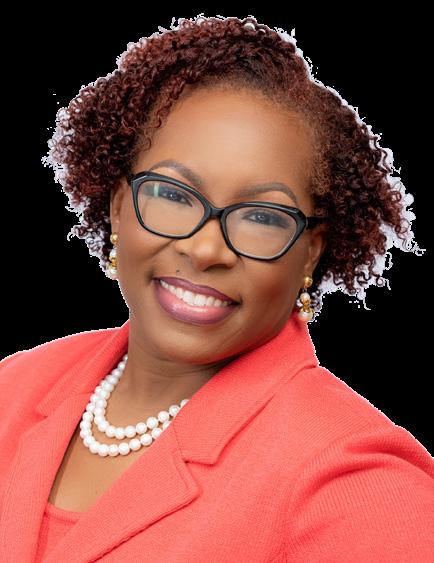
I am excited to announce that the Winter Park branch location of the Clerk of Court’s office will be moving to a new, larger, permanent home in the coming months. The new location will have expanded services to help better serve our customers.
This new building is not just a branch of our office, but it will also be a courthouse. It is three times the size of the current branch location and will include two courtrooms. There will also be double the amount of clerk service stations, a larger waiting area, and a larger wedding ceremony room. Also, all the usual services our office provides such as passports, marriage licenses, ceremonies, and payments will be available.
I am pleased to share that Self-Help services, which we first introduced at the Orange County Courthouse in 2015, will be expanded to this location. Here, customers can get pro se legal assistance for family law, small claims, and residential evictions. There is also a space dedicated as an attorney consultation room.
As Self-Help services expand to this location, there will surely be a need for more attorneys who can provide legal assistance to make sure some of our most vulnerable populations have access to justice. We can always use attorneys who are willing to serve in this way. All attorneys are welcome, but there is a special need for bi-lingual attorneys who speak Spanish, Creole, and Portuguese. If you can assist, I encourage you to apply by contacting the OCBA.
We are partnering with the NInth Judicial Circuit and Orange County Government to finalize details of the grand opening for this courthouse, which is located just off University Boulevard near Goldenrod Road. As construction gets closer to completion, we will share more information about the relocation and the grand opening, which is scheduled to take place in January 2025.
Until next time,

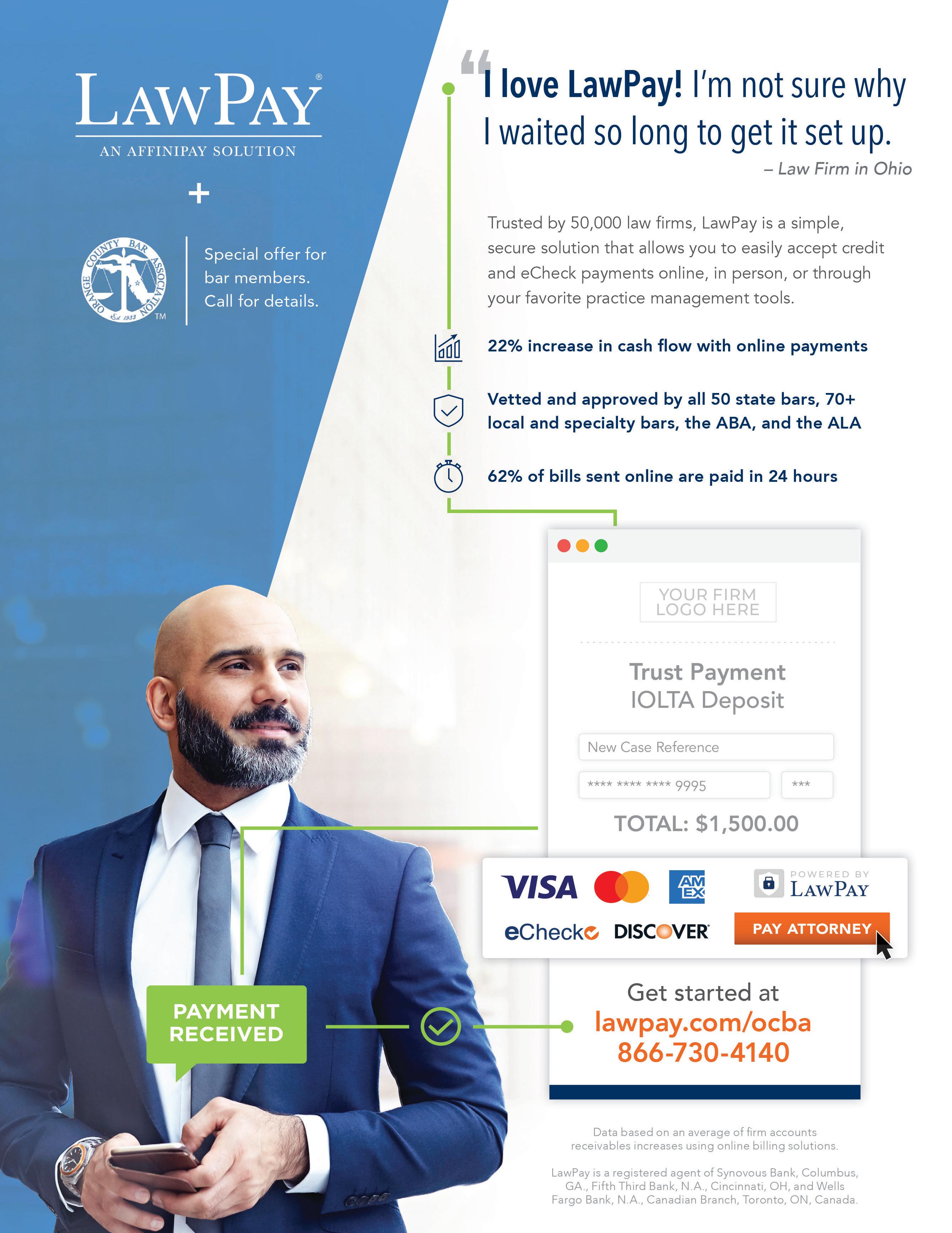

The fabric of America is a tapestry made up of people with different cultures, beliefs, and religions. Florida is a prime example of this. In fact, Orlando is one of the fastest-growing cities in America1. However, quick growth can strain resources, especially limited government resources. When you combine quick growth, multicultural communities with limited English proficiency, and finite resources, challenges arise. As we embrace these communities and their members, we accept the responsibility of providing them with access to justice.
Language creates a substantial barrier for many of our residents, and the courts have a responsibility to provide due process. Rule 2�560 of the Rules of General Practice and Judicial Administration requires, in many circumstances, that an interpreter be appointed. Currently, pursuant to that rule, the court provides interpreters for Criminal (misdemeanor and felony), Dependency, Juvenile Delinquency, Domestic Violence, and certain Domestic Relations proceedings.
In the Ninth Circuit, there is a large demand for interpreter services, as we have one of the largest Spanish-speaking populations in the state. Spanish is just one of many languages in high demand. Requests for Portuguese, Creole, and Vietnamese interpreters are also substantial. There are also requests for less common languages, many of which are only spoken in remote parts of the world. For those languages, referred to as languages of lesser diffusion (LLDs), the interpreter’s office must find a qualified interpreter in accordance with Rule 2�560; a search that is often difficult and time-consuming. These interpreters may reside out
of state, or even out of the country, presenting financial obstacles. To address this, the Ninth leverages Virtual Remote Interpreting (VRI) and video-teleconferencing to provide quality interpreting services at a fraction of the cost by eliminating travel and lodging expenses, which can become substantial. So how do we deal with these demands? Enter the interpreting department. These integral members of our court system, who are often heard but seldom seen, keep the wheels of justice turning.
The interpreting department, comprised of a manager, an assistant supervising court interpreter, and 10 Spanish staff interpreters, is tasked with coordinating coverage for all proceedings requiring an interpreter. Our interpreter services department is so big, and the demand for their services is so high, that we have a designated “Interpreter Judge.” On any given day, our interpreters must provide services for 70-95 different court proceedings. A Herculean task, one might say, but this is where the Ninth has used innovation to maximize its resources.
Years ago, the Ninth Circuit implemented the VRI system and has continued to improve upon it. Currently, our VRI is an integrated system in which an interpreter, from a computer terminal, can connect directly to the courtroom, view the participants, and, through a headset, communicate directly with the person needing interpreting services, as well as the judge, attorneys, and parties involved–all while transitioning seamlessly back and forth virtually, without needing to be in the courtroom. The sound emanates from the courtroom’s audio without the interpreter even being seen. In cer-
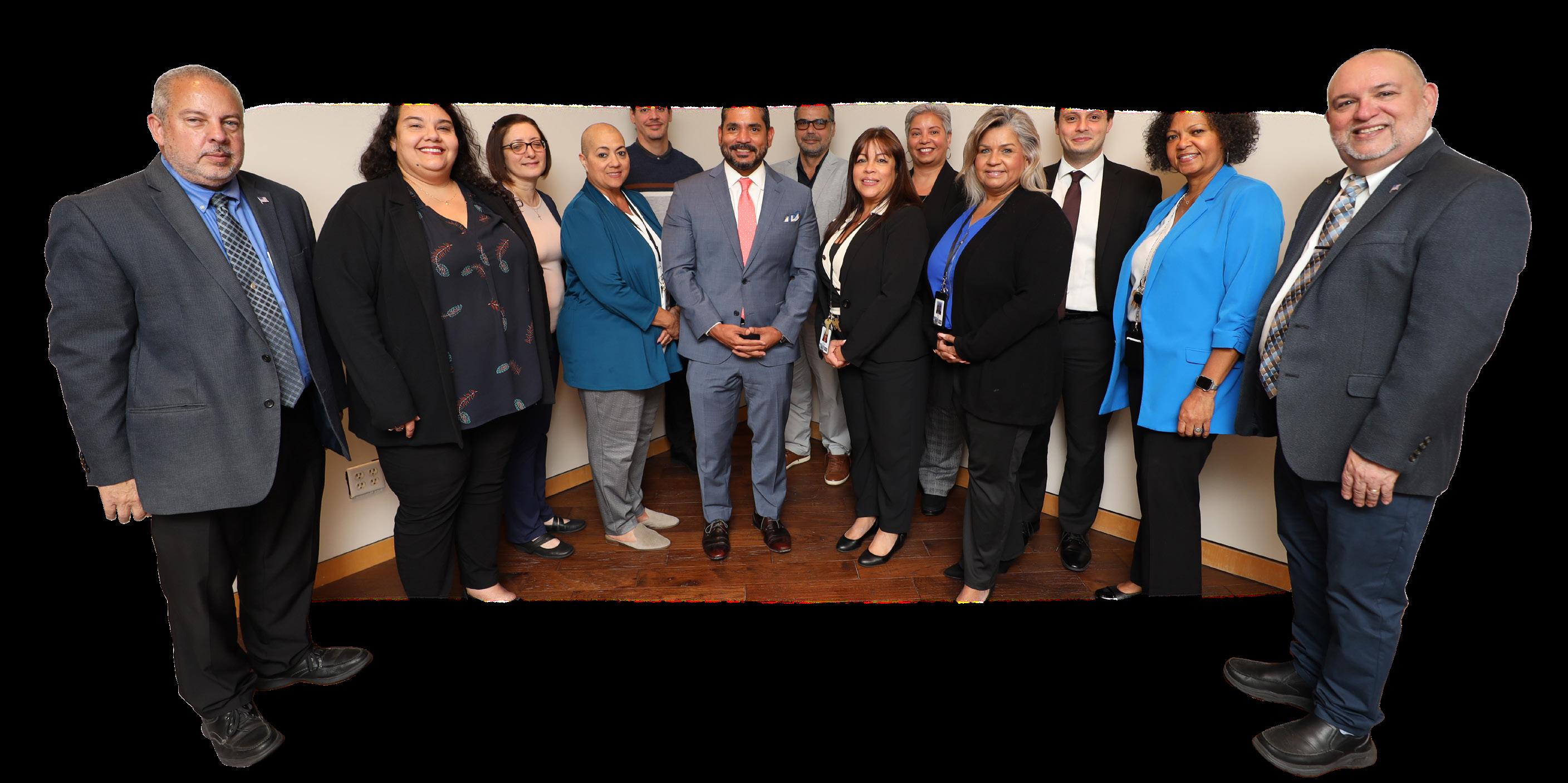


tain circumstances, the interpreter may appear by video if this is required for a particular hearing. This eliminates the downtime of traveling to and from different courtrooms or between courthouses, or even sitting in the courtroom waiting for cases to be called. From a simple touchpad on the judge’s bench, the court can access in real time a Spanish interpreter for a proceeding on demand. Scheduling conflicts do arise when we have more trials and hearings than our staff interpreters can cover. In those circumstances, I, as the Interpreting Judge, will set a priority list for the coverage of cases.
The interpreting department has its eyes looking toward the future and is always looking for ways to further innovate. We have several projects in the works to fur-
ther expand the use of remote interpreting and recognize that the Courts at some point may seek to expand the types of proceedings requiring the provision of interpreting services. When that expansion occurs, we will have to use our resources more efficiently, and while technology assists greatly, quality interpreters are the most important piece of the puzzle. We are fortunate here in the Ninth Circuit to have the best interpreting staff, a talented group with decades of experience. We rely on their knowledge and expertise, not just in the courtroom, but in identifying and retaining other talented interpreters to serve our court system. At the Ninth, we take pride in ensuring that language is not a barrier for citizens accessing the courts.

AUTHOR Michael Stone
Artificial Intelligence (AI) is reshaping industries, enabling machines to think, learn, and adapt in new ways. Application of Artificial Intelligence is supporting veterans in civilian life, physical and mental health, creating a meaningful impact on veterans’ lives. Recently, the VA released a Vision Statement with a vision of AI improving outcomes and experiences for Veterans by developing trustworthy AI capabilities in support of its mission.1
“Advances in these areas will enable advanced intelligent assistants, collaborative robotics, and fully autonomous systems”2

One initial application of AI is automated assistance with filing of VA claims. Students from Stanford created an AI tool designed to help veterans like Matt Champion, file disability claims.3 Champion, an Army Veteran who served in Afghanistan said, “It was easier for me to get into Stanford, than it was to receive VA benefits.”4 After 26 in-person meetings and more than three years, Champion finally received first time benefits.5 Another benefit if automation is eliminating error-prone repetitive human tasks.6
Notably, President Biden recently signed an executive order calling for a “talent surge” across government to retain tech experts.7 President Biden
1. Veterans Affairs. VA Artificial Intelligence Vision Statement (September 20, 2024), https:// department.va.gov/ai/
2. Veterans Affairs. Artificial Intelligence (AI) Strategy , 2024.
3. NPR Morning Edition, Artificial intelligence may help to make the VA claims filing process easier?, (March 28, 2023), https://www.npr. org/2024/05/14/1250855184/ artificial-intelligence-mayhelp-to-make-the-va-claimsfiling-process-easier
4. Id.
5. Id.
6. Veterans Affairs. Harnessing Robotic Process Automation and Claims Automation for Faster Service to Veterans (September 20, 2024), https:// digital.va.gov/delightfulend-user-experience/ harnessing-robotic-processautomation-and-claimsautomation-for-faster-serviceto-veterans/
7. Jory Heckman, Biden AI executive order calls for ‘talent surge’ across government to retain tech experts (October 30, 2023). https:// federalnewsnetwork.com/ artificial-intelligence/2023/10/ biden-ai-executive-ordercalls-for-talent-surge-acrossgovernment-to-retain-techexperts/
8. Id.

Michael Stone
Attorney at Wicker, Smith, McCoy, O’Hara & Ford, P.A that practices in commercial litigation, general liability and first party property homeowner’s insurance claims. He has been an OCBA member since 2023.
9. Jory Heckman, Biden AI executive order calls for ‘talent surge’ across government to retain tech experts (February 22, 2024). https:// federalnewsnetwork.com/ artificial-intelligence/2024/02/ va-puts-ai-use-cases-intooperational-phase-to-meet-itshealth-care-mission/
10.Lecia Sequist, MD, MPH; Florian Fintelmann, MD. Using AI for Early Detection of Lung Cancer (September 5, 2024). https:// www.massgeneralbrigham.org/ en/about/newsroom/articles/ ai-for-early-detection-of-lungcancer#:~:text=Mass%20 General%20Brigham%20is%20 making,for%20earlier%20 diagnosis%20and%20 treatment.
11.Id.
12.Rashi Maheshwari. Advantages of Artificial Intelligence (AI) in 2024(August 24, 2023), https:// www.forbes.com/advisor/in/

stated that “without the right safeguards in place, AI can lead to discrimination, bias, and other abuses.”8 As part of this executive order, the VA is developing AI predictive tools to identify which veterans are likely to do well after initial treatment for diseases, such as prostate cancer, which, are likely to need more frequent monitoring.9
However, Artificial Intelligence is not only helping
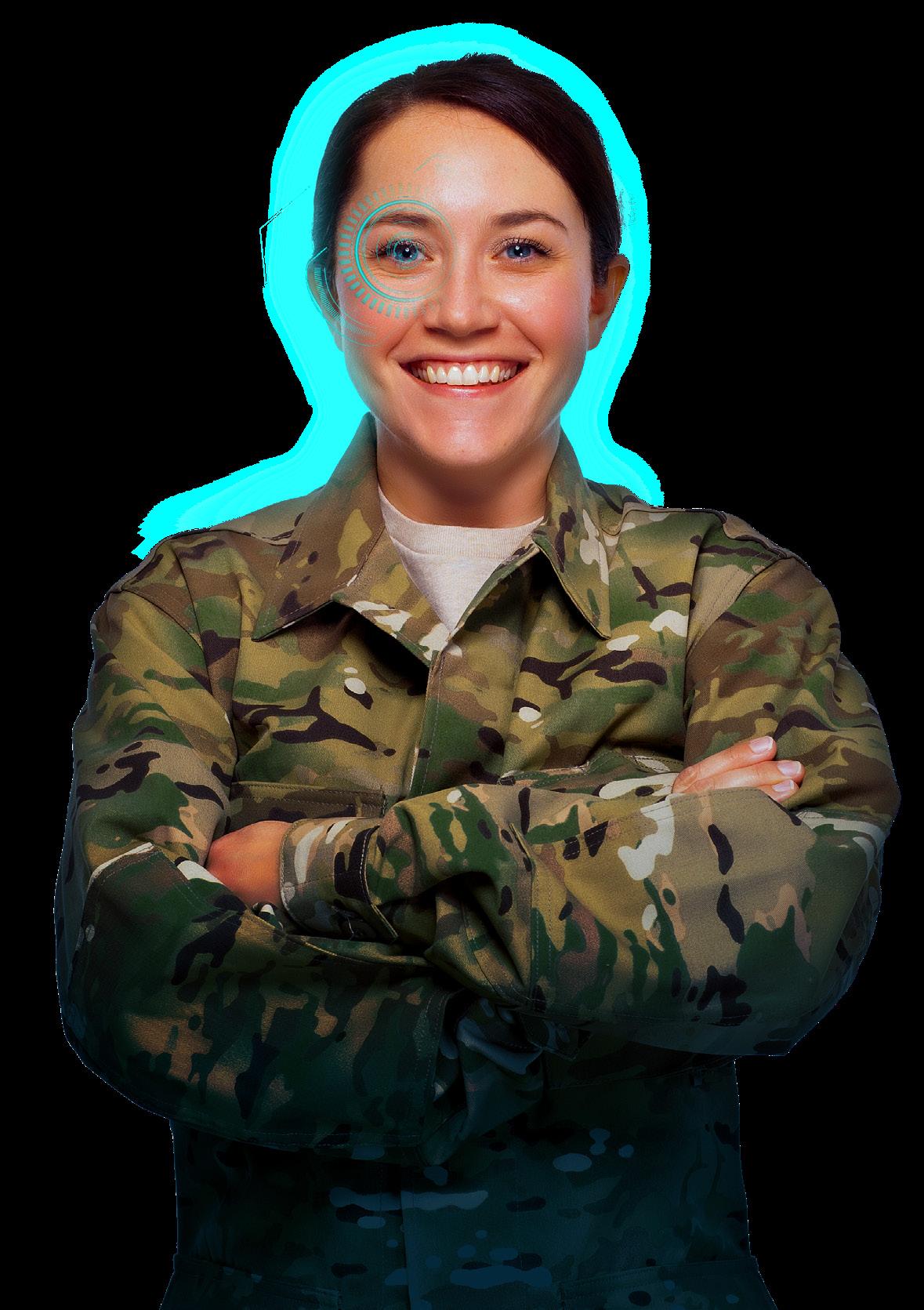
just Veterans. Artificial Intelligence can be used for a wide variety of uses, from therapy chat bots to helping doctors identify cancer before it even forms. Dr Sequist, the program director of Cancer Early Detection and Diagnostics at Mass General Cancer Center, provided that AI can closely analyze CT scans to identify signs in the lungs and assess who may be at risk for developing lung cancer in the future.10 While future research is necessary to determine the accuracy of this study, Dr. Sequist remains optimistic AI’s ability to detect patterns will be superior to diseases not visible to the human eye.11
Additionally, the most positive effect of Artificial Intelligence is the ability to reduce human error. Essentially, AI-enabled com-
puters make zero errors if programmed correctly.12 Other benefits include AIbased chatbots, faster decision making, and applications which can be used in areas which are hazardous to humans.
Ultimately, Artificial Intelligence is new and continues to evolve. From helping veterans with filing claims to healthcare and beyond, AI is not only giving veterans the tools necessary to navigate the complexities of post-military life but is also giving employers doctors, and ordinary people more efficient, and proactive processes in their everyday life. Overall, AI is freeing up valuable time for people to focus on what matters most and allowing individuals to reclaim their time for personal and meaningful pursuits.
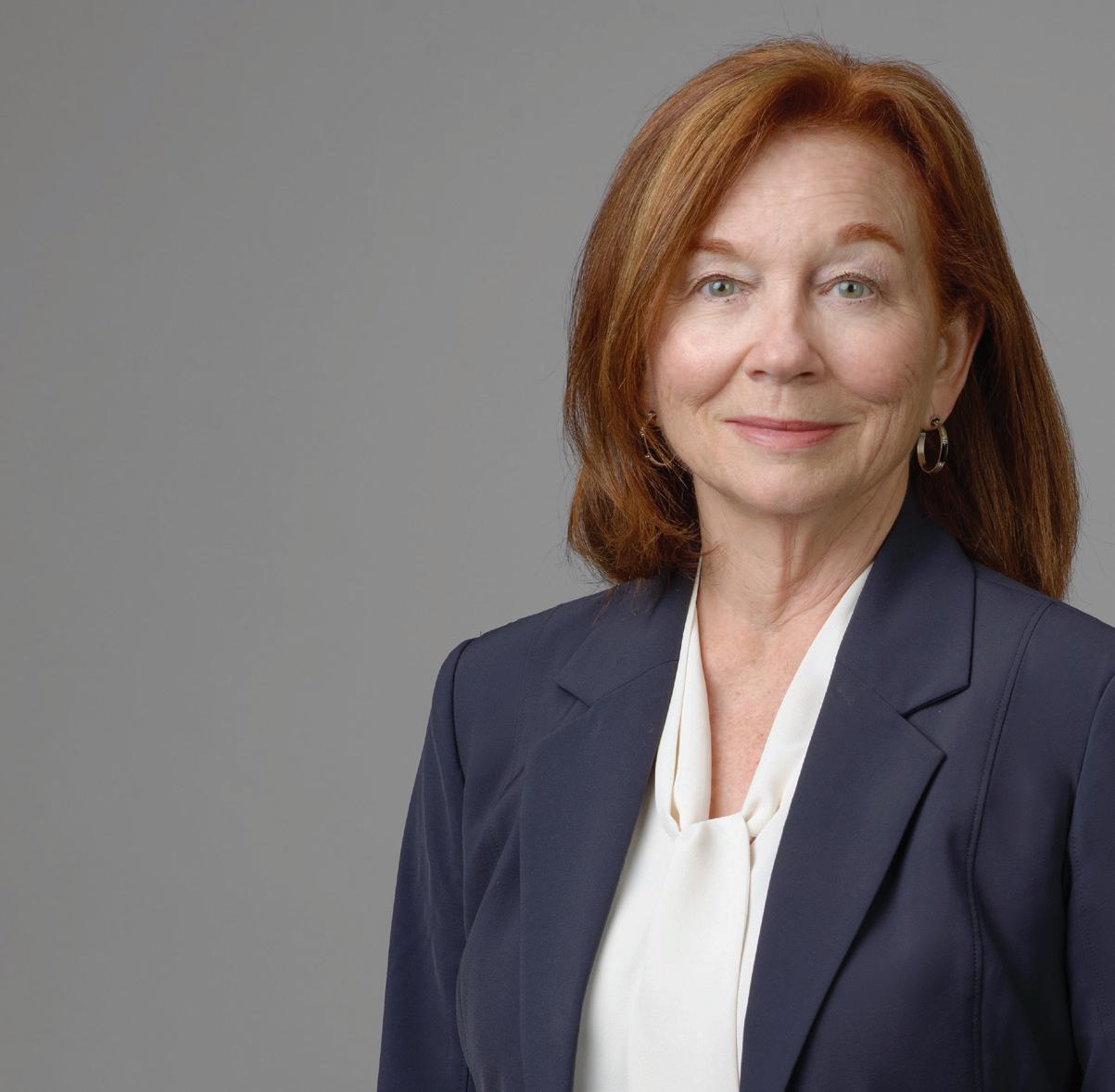
LEAP is leading the future of legal

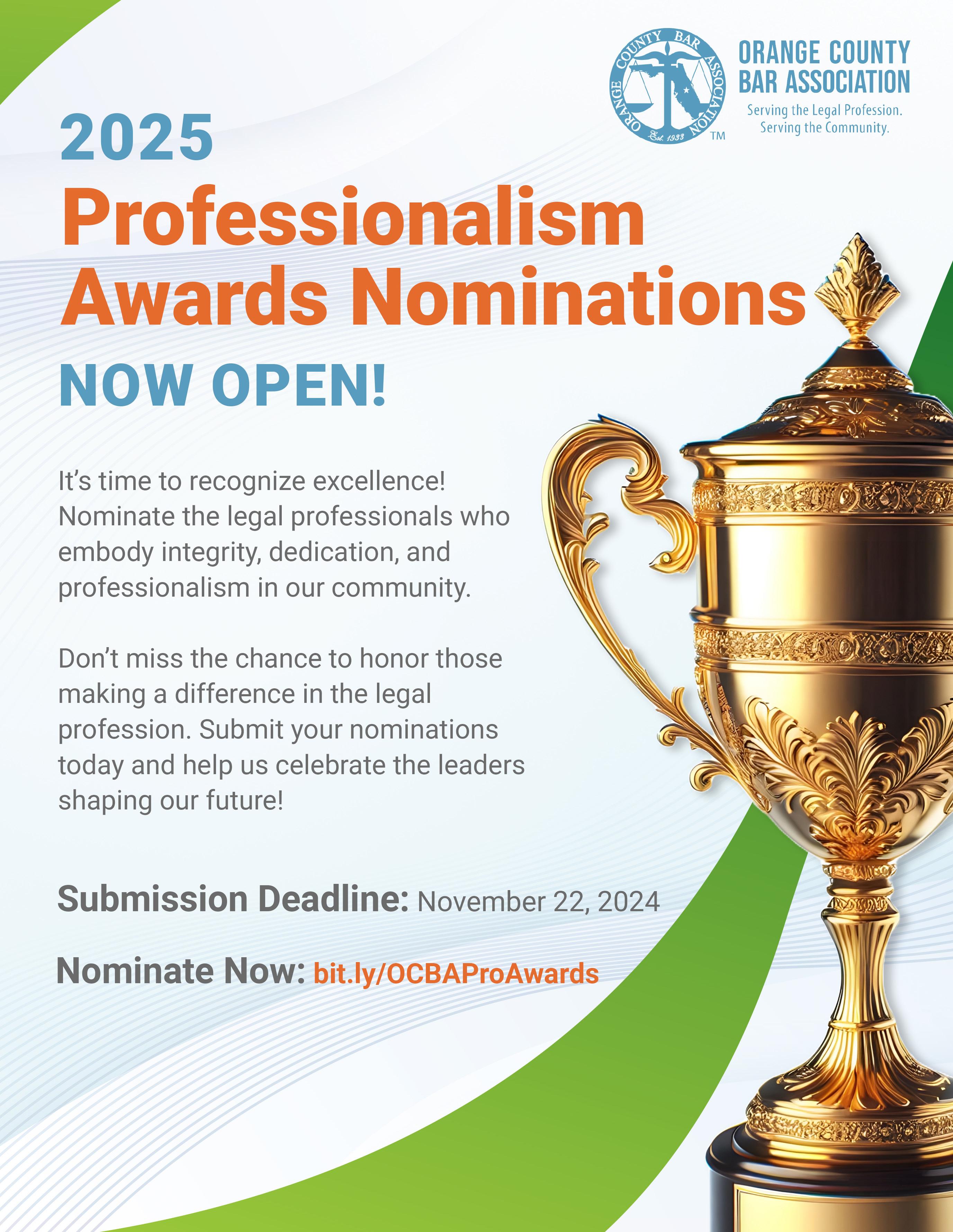
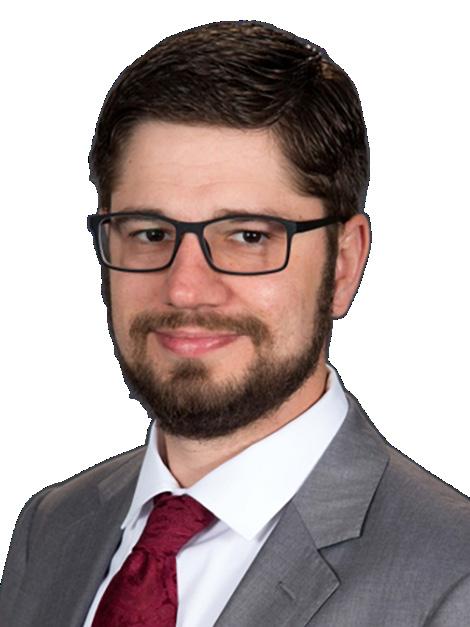
On May 8, 2024, the ABA Standing Committee on Ethics and Professional Responsibility released a seven-page Formal Opinion 511R: Confidentiality Obligations of Lawyers Posting to Listservs.* The Opinion’s summary is provided below (including a notation that “Listserv” is a registered trademark):
Rule 1�6 prohibits a lawyer from posting questions or comments relating to a representation to a listserv, even in hypothetical or abstract form, without the client’s informed consent if there is a reasonable likelihood that the lawyer’s questions or comments will disclose information relating to the representation that would allow a reader then or later to infer the identity of the lawyer’s client or the situation involved. A lawyer may, however, participate in listserv discussions such as those related to legal news, recent decisions, or changes in the law, without a client’s informed consent if the lawyer’s contributions will not disclose, or be reasonably likely to lead to the disclosure of, information relating to a client representation.
*Listserv® is a registered trademark. When the
word listserv is used in this opinion, it is intended to describe and apply to any electronic-based discussion group and/or email community.
You may have learned about this opinion through one of your own listservs or other legal discussion boards, as it raises serious concerns particularly in those forums. The opinion lays out what may appear to amplify an attorney’s confidentiality requirements related to questions and hypothetical fact patterns posted to a listserv-typegroup, which consists of non-firm-member colleagues. The opinion goes on to warn lawyers about not only in submitting forum-based inquiries, but also in replying to others, developing networks, and regaling war stories.
The opinion focuses on the risk of a client’s identi-
ty being revealed, as noted here: “[a]dditionally, when lawyers represent only one client (as in the case of inhouse counsel or government lawyers) or their client’s identity can be readily inferred (as in the case of a litigator seeking assistance with a pending or contemplated action), a description of specific facts or hypotheticals that are easily attributable to the client likely violates Rule 1�6 in most contexts.” This appears to be a per se limitation for any attorney who represents a single client.
The Confidentiality of Information rule comments found in both the ABA Model Rules of Professional Conduct and the Florida Rules of Professional Conduct contain similar statements regarding Authorized Disclosure:
“Except to the extent that the client’s instructions or special circumstances limit that authority, a lawyer is impliedly authorized to make disclosures about a client when appropriate in carrying out the representation.” (emphasis added).
The opinion addresses several citations of legitimate impliedly authorized disclosures, none of
which are instances related to listservs.
Both sets of rules also contain exceptions (such as to prevent death) when it comes to disclosing confidential information. The opinion does not provide detailed analysis of the ABA confidentiality exceptions, as the opinion notes the committee “cannot envision a recurring situation in which any of the exceptions are likely to authorize disclosures of information relating to a representation on a lawyer’s listserv.”
While the opinion is not binding on Florida practi-
tioners, there is a relevant Florida exception that does not exist in the ABA rules:
“A lawyer may reveal confidential information to the extent the lawyer reasonably believes necessary to: (1) serve the client’s interest unless it is information the client specifically requires not to be disclosed[.]”
This Florida exception is distinguished from those within the ABA Model Rules, and may very likely impact the language of Formal Opinion 511R, if
a similar rule existed in the ABA Model Rules. The opinion highly praises the use of listservs and group forums, within the guidelines of confidentiality. It is important for Florida practitioners to be mindful of the rules, and post appropriately.
ABA Formal Opinion 511R
ABA Model Rules of Professional Conduct Rule 1�6
R. Regulating Fla. Bar 4-1�6
The opinion addresses several citations of legitimate impliedly authorized disclosures, none of which are instances related to listservs.

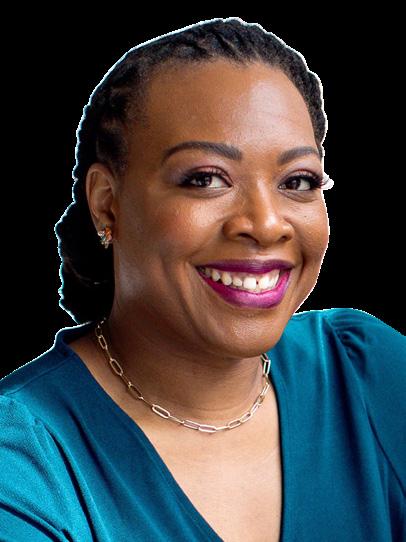
is
As attorneys, we’re wired to focus on helping our clients stay out of trouble, but many law firms miss the chance to protect and grow when it comes to our brands. A common misconception is that law firms aren’t like other businesses and don’t need branding efforts beyond what the law requires. However, building and safeguarding your brand can benefit your practice in today’s competitive market. Think of your law firm not just as a professional service but as a business with a brand representing who you are, your expertise, and your impact. When you protect this brand, you set your practice up for growth beyond the boundaries of your license.
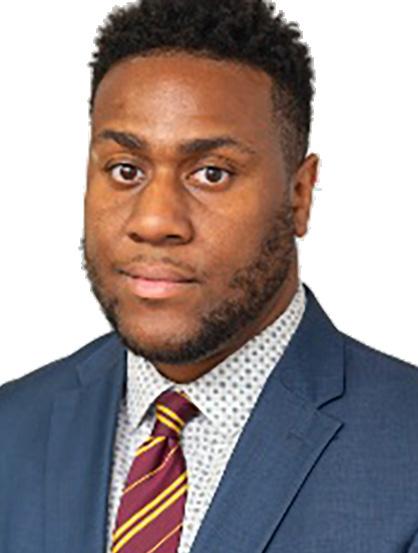
Sean Mendez-Catlin, Esq.
is a founding partner of MC & J Law, PLLC, where he practices business and intellectual property law. He has been a member of
Here’s how brand protection can benefit your law firm—and the risks if you don’t take it seriously.
Protecting your brand refers to a range of actions, including registering your firm’s name and logo as trademarks, securing copyright for original materials you create, and even setting up confidentiality protections for proprietary information, like your firm’s processes. Think of it as fortifying your reputation and ensuring no one else can copy, misuse, or misrepresent what you’ve built.
efit your clients, expand your reach, and create new revenue streams.
Here’s why brand protection matters:
A. Establishes Your Reputation and Credibility
Your firm’s name, logo, tagline, and unique approach to cases make you recognizable. Protecting these elements through trademark registration prevents others from using your brand identity and helps your firm stand out. Clients will remember your firm’s name as one they can trust and recommend without confusion.
B. Increases Your Firm’s
Imagine someone else setting up a shop using a name similar to yours. This can be confusing for potential clients and lead to a loss of business. By securing trademark rights, you protect the unique aspects of your firm that clients have come to trust.
Many attorneys don’t think of their firm as a brand, but your firm’s name and reputation are, in fact, critical business assets. Protecting your brand helps you do more than keep what’s yours—it can elevate your practice to ben-
When a law firm has a recognizable brand, it can attract clients more easily and even have a higher valuation if it ever comes time to expand or bring in a partner. A strong, legally protected brand is a valuable asset, making your firm stand out in a crowded market.
If you have a well-known brand, you may be able to create opportunities outside your core services. For example, some law firms with strong brands have gone on to offer consulting services, publish branded legal guides, or teach workshops. These additional revenue streams can increase your firm’s resilience
and expand your impact without the need to practice law in each instance.
Here’s a quick roadmap to help you take the first steps in protecting your brand:
A. Register Your Firm’s Name and Logo as Trademarks
A trademark is a legally protected brand name or symbol. Registering your firm’s name or logo as a trademark with the United States Patent and Trademark Office (USPTO) prevents others from using it and gives you legal rights if someone infringes upon it. Without a trademark, another firm—even one outside your state—could legally use a similar name.
B. Consider Copyright for Your Content
If your firm produces written content, like blogs, client handbooks, guides, or training videos, copyright can help protect this work from being copied or misused. By copyrighting your original content, you retain ownership and control of its use, protecting the unique value you bring to clients.
C. Implement Confidentiality Protections
The way your firm delivers its services—your stepby-step approach to cases, unique tools, or specific client engagement meth-
ods—could be protected as trade secrets. Establishing a confidentiality framework protects these methods from being copied by competitors and lets you retain a competitive edge.
Consider a small family law practice called “Heartfelt Legal,” which became known in its community for its compassionate approach to divorce cases. Heartfelt Legal trademarked its name and logo, which helped it stand out as a unique brand in the local market. Soon, clients from nearby areas began seeking Heartfelt Legal’s services because of their strong reputation. Over time, the firm was able to develop branded guides and host community seminars under the “Heartfelt Legal” name.
Other firms might have tried to adopt similar names without brand protection, creating confusion. However, because Heartfelt Legal took steps to protect its brand, the firm could expand confidently and build a respected reputation that clients could trust.
If you don’t protect your brand, you face several
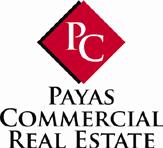

Open area - Can fit up to 4 work stations
Breakroom
One restroom
File storage area
Parking 4 per 1000 parks
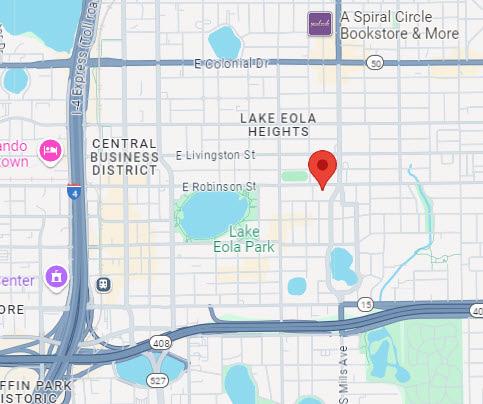

risks that could affect your firm’s future growth and reputation:
A. Brand Confusion and Client Loss
Competitors can legally use names and logos similar to yours without a trademark. This can lead to brand confusion, and clients may choose another firm by mistake. Losing clients due to confusion is not just frustrating; it’s costly.
You lose the legal ground to defend your brand if you don’t secure a trademark, copyright, or confidentiality protection. This
means if someone else copies your name, logo, or original content, there’s not much you can do to stop them, even if it impacts your practice.
If your brand isn’t legally protected, expanding your services or creating branded materials is hard. Imagine leveraging your firm’s expertise through a published guide, branded workshop, or consulting opportunity but holding back due to concerns over brand infringement. Protecting your brand opens the door to these kinds of growth opportunities.
When your brand is protected, you can do more than just represent clients in legal matters. Here are a few ways to think outside the box and grow your brand:
Create guides, workshops, or online courses that provide general legal knowledge to the public. These can be published under your brand, reaching more people while establishing your firm as a leader in your field.
Think about creating branded courses or classes that provide legal insights on everyday issues. Many people look for information before they’re ready to hire an attorney, and by offering these resources under your brand, you can capture clients early in their journey.
tional content platforms. This visibility attracts clients and makes it easier for them to remember and refer your firm.
Your law firm is more than just a service—it is a brand with values, a reputation, and a unique approach that resonates with clients. Protecting your
Investing in brand protection is like building a sturdy foundation. It secures what you’ve built, guards against potential risks, and sets you up to grow. Protecting your brand starts with simple steps, but the impact on your firm’s future can be profound. So, take charge, protect your brand, and let your firm thrive beyond the boundaries of your license.


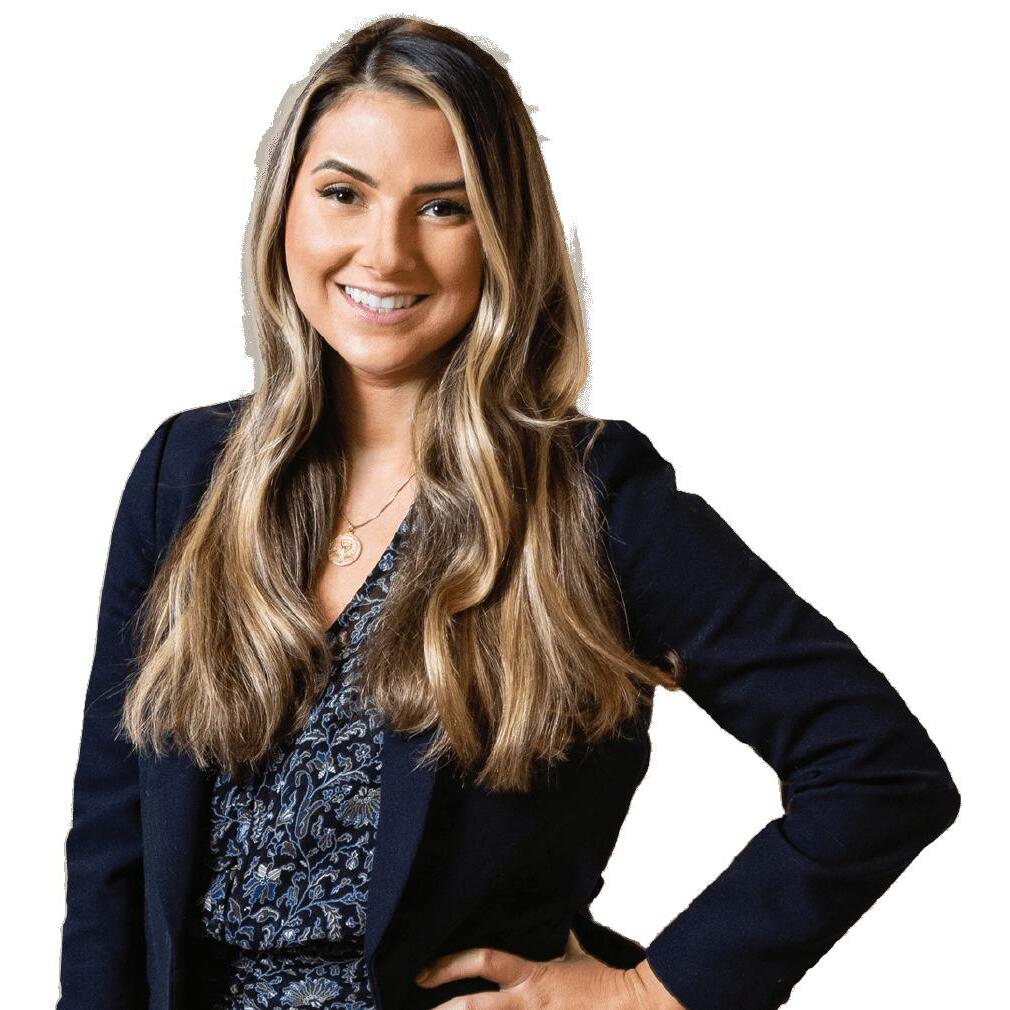
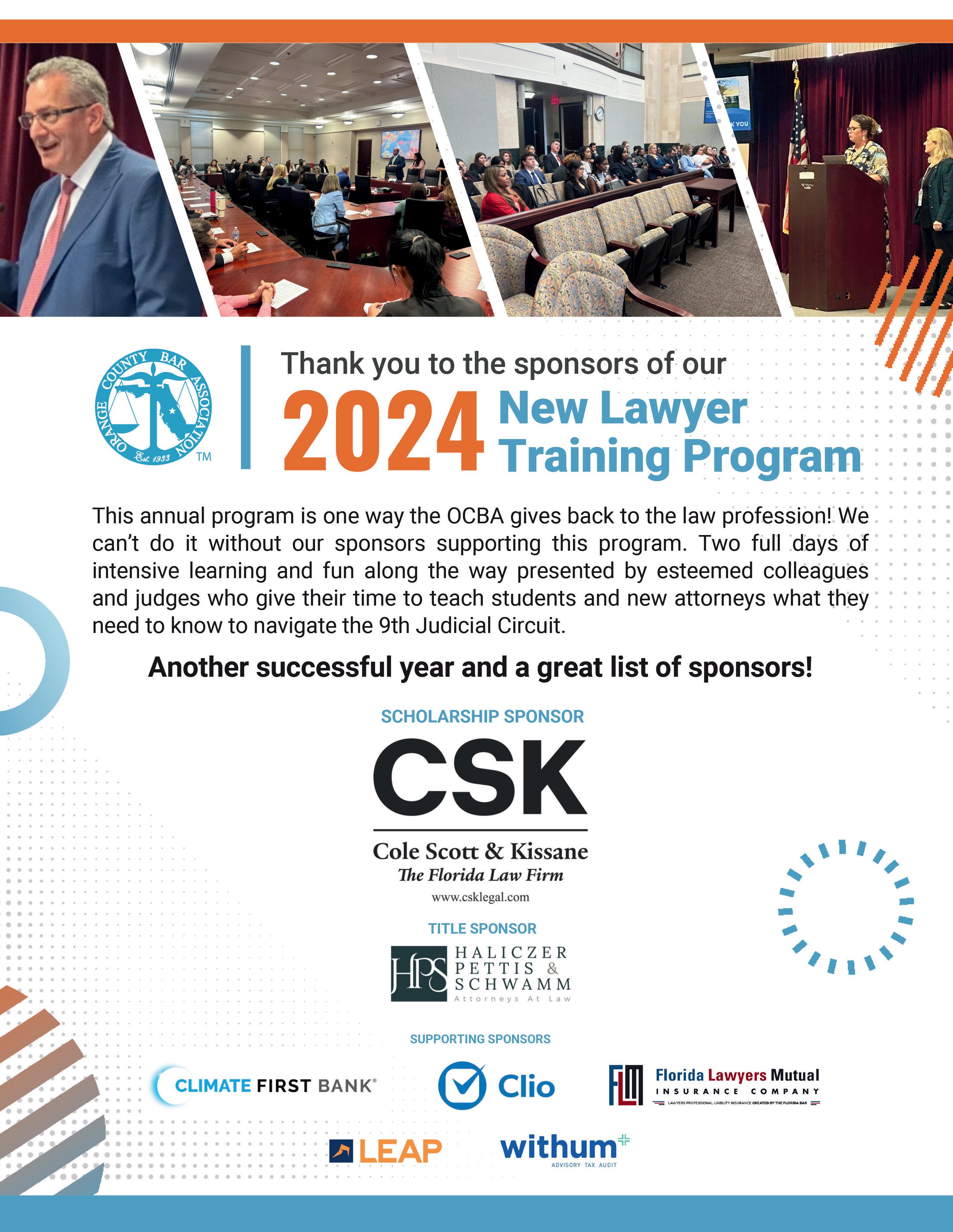

Dear Question Quinn:
I’m an old school lawyer and am used to in person appearances, live depositions, and working out deals in the hallway with my opposing counsel while we wait to be called for our case management conferences. I was hoping Zoom would be a short phase and would disappear once COVID resolved, but to my disappointment, it seems to be sticking around. Since this technology seems to be sticking around for the long haul, what do I need to know? —Tentative with Technology
Dear Tentative with Technology, Zoom and other remote meeting applications have circulated for years but came into the limelight when COVID forced remote proceedings. Now that courthouses and businesses have reopened, however, courts and related proceedings continue to use these services prolifically. Learning skills to use these programs and how to appear professional and confident in your hearings and depositions is important in this day and age.
1.
For in-person hearings, trials, and depositions, lawyers can express themselves through their clothing with prints, colors, and patterns and still
appear professional. Zoom is a little different. Patterns on blouses and ties that might show personality in person come across as busy or even dizzying on Zoom. Stripes can blur every time you move on camera and can be distracting at best and cause your audience’s eyes to cross at worst. Other designs like dots, paisleys, or swirls can also appear too busy and distract your witness or judge away from your well-formed legal arguments or questions and draw their focus away from where you want it. Also, make sure to tell your clients to dress appropriately too!
2. Check Your Lighting
Lighting is also very important. Nothing is worse than appearing like a shadow in a dark room
while trying to argue your point. Try to sit in a well-lit room, with any windows to your front and behind the computer, if possible. This will provide the best possible lighting for your proceeding. If these options are not possible, investing in an inexpensive ring light or other light source to place behind your camera will brighten your appearance and remove those pesky shadows. If your clients are appearing by Zoom, make sure they have a clean, well-lighted place where they can sit without being interrupted.
3. Test Your Program Before Joining a Meeting
Finally, one of the most important things you can do is to test your Zoom account before you need to use it. If this is your first time (or first time in a long time) using Zoom, do this at least one day before your Zoom event. Look through the video and audio settings, see yourself on camera, and make sure your sound works. This includes your computer’s sound input and output: your audience needs to hear you just as much as you need to hear them. Make sure you are centered in your camera, practice looking at the camera while talking rather than at the screen showing your-
self or others, and make sure your background is either court-appropriate or blurred. “Touch up my appearance” is one of my favorite features – it
Practice makes perfect with this type of technology, and do not be embarrassed or flustered if you have technical difficulties. Try to make sure you
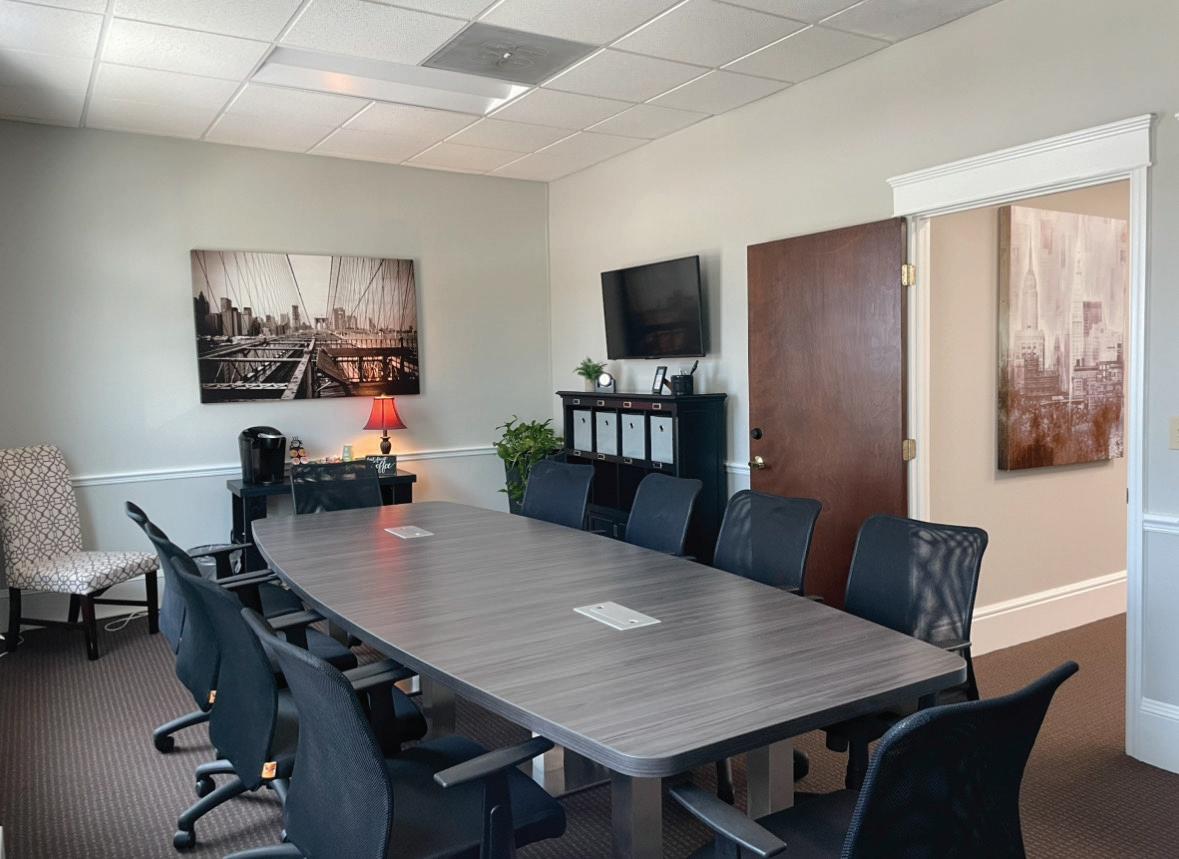
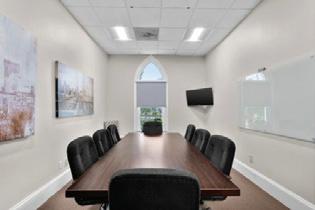




SATURDAY, APRIL 5, 2025 THE ROSEN SHINGLE CREEK, ORLANDO, FL
If interested in sponsoring the event, contact Ursla Gallagher at Urslag@ocbanet.org for more details. Sponsorship Inquiries: REGISTER NOW bit.ly/Gala2025 HTTPS://ORANGECOUNTYBAR.ORG/EVENTS/EVENTDETAILS.ASPX?ID=1892751&GROUP=

IFor more information on dependency problem solving courts or to become a GAL, please contact Mexcye C. Roberts, Esq. at mroberts@ legalaidocba.org. For more information on how to become a financial donor or to help with fundraising efforts, please contact Donna Haynes at dhaynes@legalaidocba.org or by calling 407-515-1850.
consistently hear from our pro bono attorneys that serving as a Guardian ad Litem (GAL) is one of the best professional experiences they’ve ever had. That’s because GALs are change agents guiding children through the most difficult times of their lives. Children enter the dependency system because of abuse, abandonment, or neglect. Their lives have been completely disrupted, often being removed from their parents and the only homes they’ve ever known. Dependency court is a traumatic experience for all children, and GALs help to bridge the gap by establishing bonds with the children through visits and advocating for their best interests.
nency, and stop the cycle of maltreatment. I was approached to represent Children’s Legal Services in these hearings and immediately said yes. After I transitioned to teaching, I wanted to remain involved, and the GAL Clinic has given me that opportunity. It has been an absolute honor serving as a GAL and working with the amazing ECC team.”
There’s a saying, “Many hands make light work!”
This is especially true with GAL work. The GAL program is fortunate to have many valuable pro bono GALs who assist with serving the needs of children in Orange County. The GAL program is appointed to all dependency cases in Orange County, one of the largest counties in the state. There are two main courtroom divisions and one magistrate division. The GAL program is also assigned to the Family Dependency Drug Court (FDDC/Drug Court) and Early Childhood Court (ECC/Baby Court) specialty court divisions. Drug Court and Baby Court are part of the Ninth Judicial Circuit’s problem solving
courts. We are fortunate to have a dedicated partner who assists with the specialty court division. Attorney Kim Crag-Chaderton, an Associate Instructor at Florida Agricultural and Mechanical University College of Law, serves as a Pro Bono GAL in the Ninth Circuit’s Family Dependency Drug Court and Early Childhood Court.
“I have worked in the dependency arena most of my career. In 2015, the Dependency Early Childhood Court (ECC) was enacted in the Ninth Circuit, serving as a specialty division of the dependency court. The goal of ECC is to improve child safety, heal trauma, repair parent/child relationships, promote timely perma-
Ms. Crag-Chaderton began her career in child advocacy as a DCF attorney. She worked for the Department of Children and Families-Children’s Legal Services (CLS) as a Senior Attorney for 13 years, advocating for the safety, well-being, and permanency of Florida’s abused, abandoned, and neglected children. Her duties and responsibilities included having primary responsibility for multiple cases advocating for children by employing best practice litigation techniques while ensuring that Florida and federal legal requirements were met to secure permanent and safe homes for dependent children. This included collaborating with investigators and case managers to gather evidence necessary to support the legal action appropriate for each child, along with preparing those partners to serve as witnesses at trial and evidentiary hearings.
Ms. Crag-Chaderton joined the FAMU Law Clinical programs as a faculty member in 2018, overseeing the Criminal Defense Clinic. While serving in the Criminal Defense Clinic, “I saw that the law school previously had a GAL Clinic that was no longer being offered. In Spring 2019, I approached the Director of the Legal Clinic to reactivate and was given the green light. The GAL Clinic has been active since Fall 2019.”
Ms. Crag-Chaderton, why do you serve as a GAL? I serve as a GAL to make sure a child’s voice is heard and their needs and well-being are not overshadowed by the difficult situations that surround them, through no fault of their own.
What have been your key learnings while serving as a GAL? Be child-focused, and monitor on an ongoing basis.
Ms. Crag-Chaderton shared the following “Best Practices” when serving as a GAL:
1) A GAL is to be a neutral investigator who makes recommendations for what is in the child’s best interest, not a referee in a contest between parents. Focus discussions on the child and not the parents’ wishes or needs.
2) A GAL should not show bias or prejudice.
3) A GAL should not provide legal advice to parties.
Not only does Kim serve as a GAL in many of our drug court and baby court cases, but also she teaches young lawyers about the importance of serving the underserved. Her duties and responsibilities at FAMU Law Clinic include teaching law students on substantive areas including depen-
ATTORNEY
Meybelin Barrera
Caryn Lynn Bellus
Jordan Hunter Benbow
Cynthia CarrascoEscalera
Dana Elaine Goza
Jonathan Andrew Hewett
Stephen Iacullo
Tyler Lueders
Adolphus Thompson
Richard Charles Wolfe
LAW STUDENT
Ga’Kia Baker
Krystal Calderon
Ryan M. Campbell
Jose Carapaica
Gabrielle Colton
Ana Sofia Guillioli
Emily Largent
Gisela Rojas-Carreno
Ana Romero
Amanda Shivmangal
Maqia Simmons
PARALEGAL STUDENT
Hannah Sarkadi
Jennifer Shareef
PATRON
James Franzese
Christopher Kendall
Velena Phillips
Ken Richardson
Daniel Smith
Lynetta Tipton Steed
dency, delinquency, guardianship, mental health, disability, medical decision-making, education law, child support, and immigration. Ms. Crag-Chaderton also supervises law students in legal advocacy on behalf of children while providing students with a solid foundation in lawyering skills and values. This clinic addresses constitutional, statutory, and common laws impacting children, including the legal interests of parents and the government and the law’s evolving con-
ception of children’s rights. Training young lawyers to serve the needs of others at the start of their legal careers will hopefully foster a lifetime of dedication and commitment to providing pro bono service.
The GAL Program extends heartfelt appreciation to attorney Kim Crag-Chaderton and all pro bono GALs who take up the mantle to serve the needs of children. Your dedication improves the lives of many in need, even beyond the children you serve.

Staff Attorney, OCBA Member since 2024
For more information, or to take a case pro bono, please contact Jessica Valentin at jvalentin@legalaidocba. org. For more information on how to become a financial donor or help with fundraising efforts, please contact our Development Director, Donna Haynes, at dhaynes@ legalaidocba.org or by calling 407-515-1850.
On April 1, 2024, the Florida Supreme Court’s new limited appearance rule came into effect, creating a significant change in how attorneys can assist individuals in a limited capacity in court proceedings. Under Florida Rule of Civil Procedure 1�041, attorneys now can provide targeted, temporary legal representation for litigants in court proceedings at specific stages of a case, without committing to full court representation for the entirety of the case.
Under Rule 1�041, an attorney’s limited notice of appearance must be filed prior to any hearing or proceeding and should specify the scope and manner in which the attorney will provide limited court representation. Upon completion of the hearing or proceeding, the attorney’s limited representation is then automatically terminated. It is suggested the attorney also file a notice of termination of limited appearance. We suggest a complete review of Rule 1�041 for the specific requirements for filing a limited notice of appearance.
Here, at the Legal Aid Society, we have readily embraced this new limited
appearance rule. Our attorneys have already begun to file limited appearances in various court cases, specifically in our housing and consumer court cases. This change allows Legal Aid to offer our clients greater legal representation in court cases while alleviating the significant stress and intimidation that comes with navigating court proceedings pro se. This new limited appearance rule permits the Legal Aid Society to step in and provide targeted court representation when our clients need it the most!
For instance, in our housing court cases, the Legal Aid Society now utilizes notices of limited ap-
pearance to represent tenants in their rent deposit hearings after an eviction action has been filed. Rent deposit hearings are statutorily required in certain circumstances and are essential to enforcement of a tenant’s due process rights under Florida law. We have been successful in negotiating settlements as a direct result of our limited appearance representations that would not have occurred absent these limited representation. These are great results for tenants, landlords, our judiciary, and our community as a whole!!
Similarly, this new limited appearance rule has also been helpful in assisting our clients in their debt collection matters. For example, after a wage or bank account garnishment, clients often face a claim of exemption hearing due to their legal status as “head of family.” In these situations, Florida law allows a person who is providing more than onehalf (½) of the support to a child or dependent to protect their wages from gar-
nishment (so that this crucial money can be used to raise and support the child or dependent). Our attorneys at the Legal Aid Society can now file limited notices of appearance to represent clients during these claims of exemption court hearings, addressing their immediate legal needs without committing to the entirety of their debt collection court case.
Overall, Florida’s new limited appearance rule reflects a growing recognition of the need for flexible legal services. For organizations such as the Legal Aid Society, this lim-
ited appearance rule offers a practical solution to the challenges of providing comprehensive legal assistance with limited resources. As we continue to navigate and utilize this new rule, we remain committed to leveraging its benefits to better serve our clients and our community.

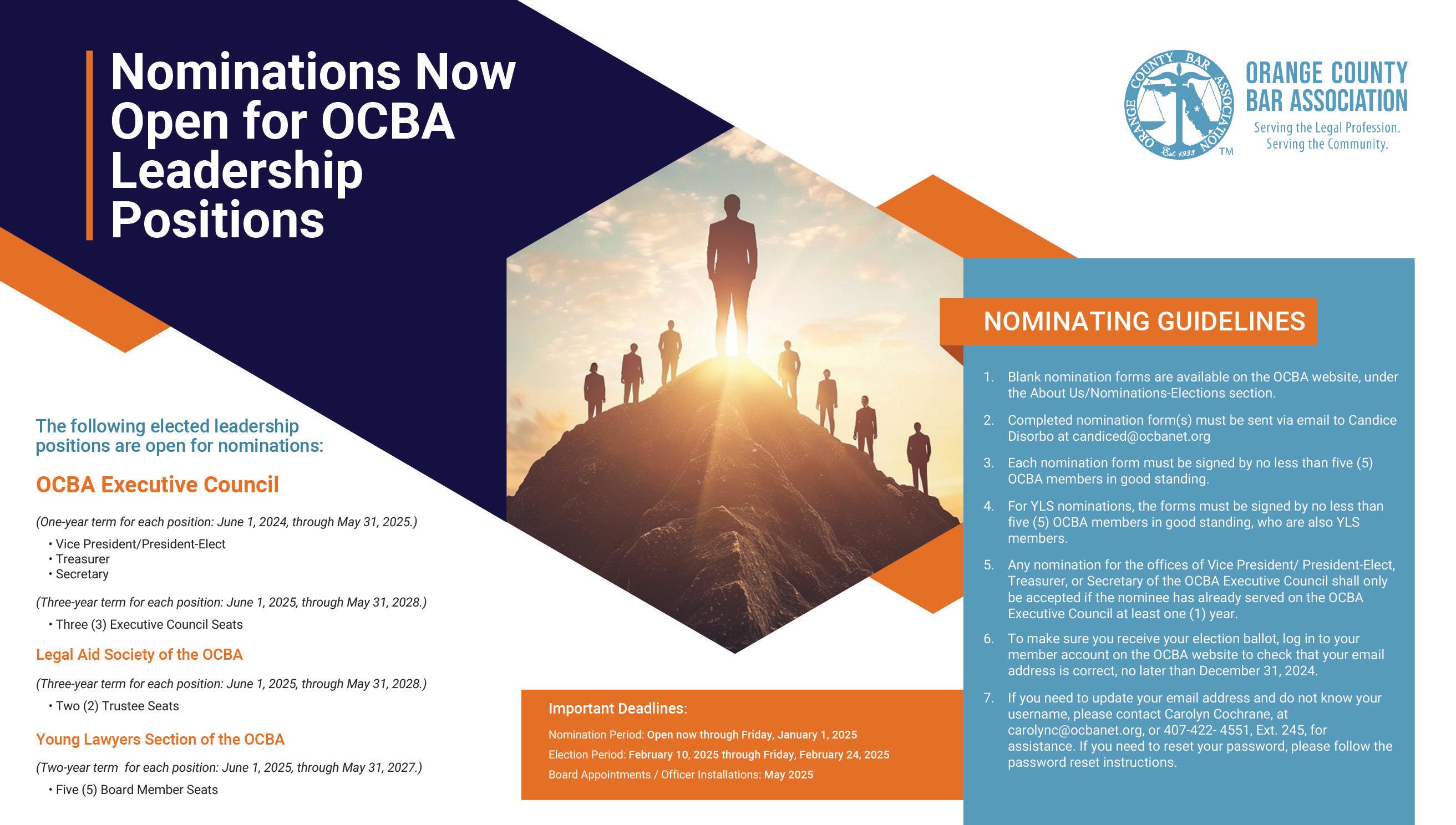
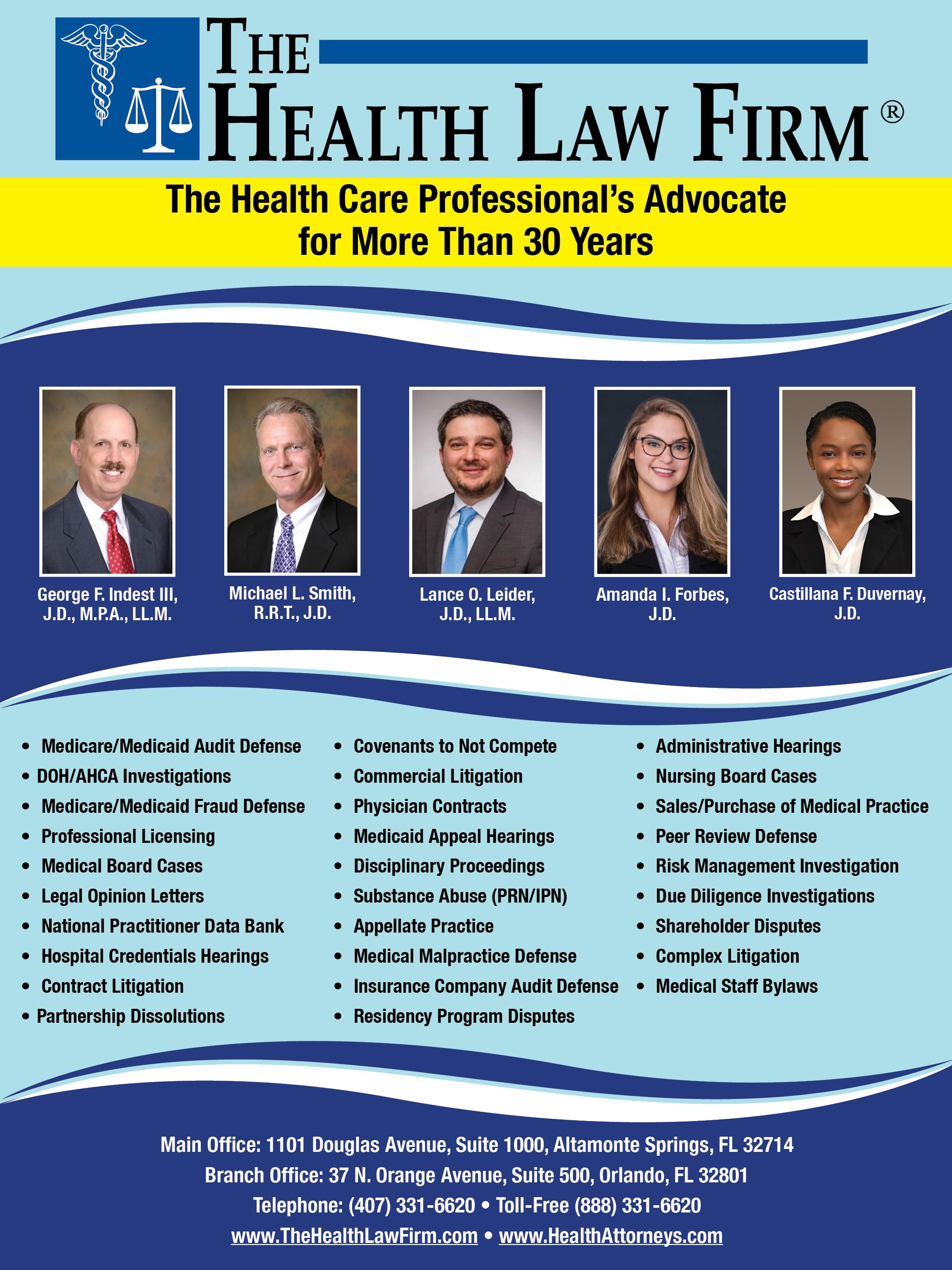

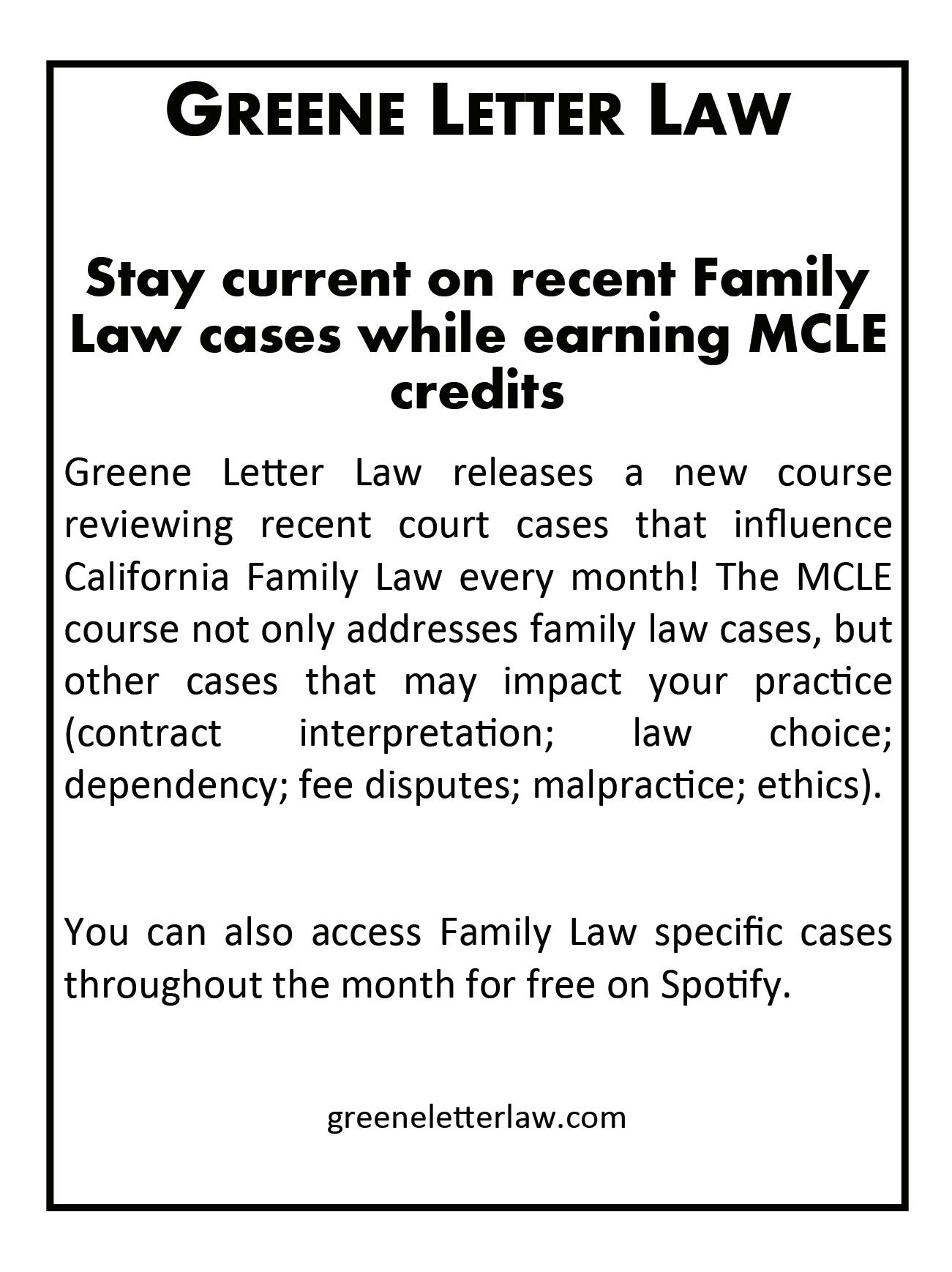
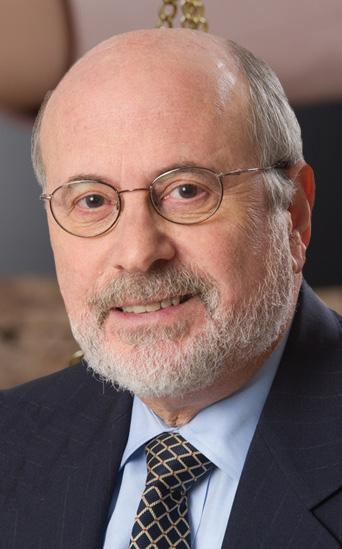
Larry M. Roth lroth@uww-adr.com proudly announces Larry M. Roth has joined its distinguished panel.
linkedin.com/company/upchurch-watson-white-&-max Upchurch Watson White & Max MEDIATION GROUP
» 42 years of litigation experience representing both plaintiffs and defendants. Certified Circuit Civil Mediator since 2005.
» Admitted to U.S. District Courts for Middle, Southern and Northern District of Florida, and Pro Hac Vice admissions in 26 states and territories.
» Background in commercial litigation and experience in products liability, personal injury, malpractice, professional negligence, pharmaceuticals, premises liability and trucking cases.






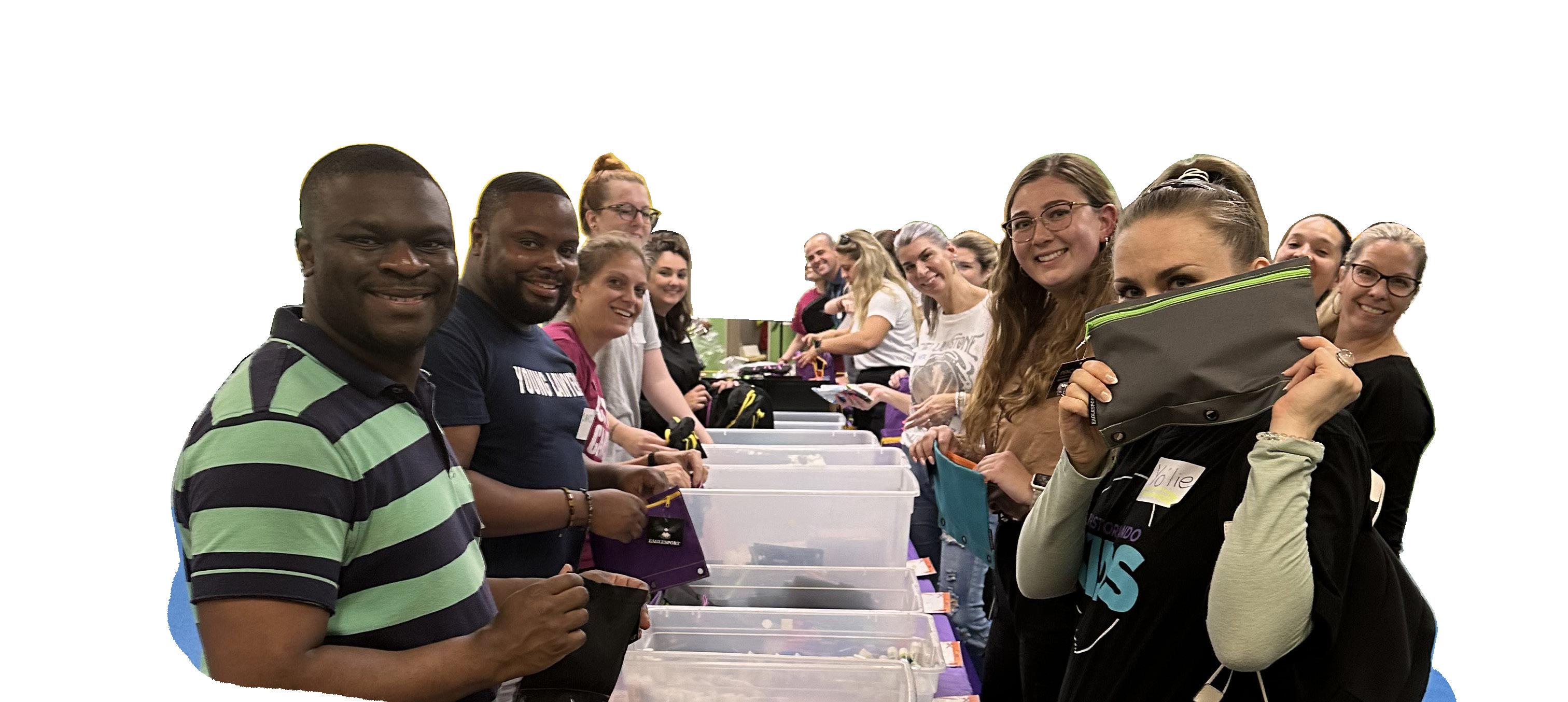

November is here, and so are the pumpkin spice lattes! Here’s what YLS has been up to during this Autumnal season:
SATURDAY, OCTOBER 5TH, we had our annual Gator Bus Trip. The wheels on the bus took our group of hopefuls up to Gainesville for the Florida Gators game against our UCF Knights. Regardless of the outcome, everyone had a ball!
ON OCTOBER 13TH, YLS enjoyed a peaceful day at Blue Jacket Park. Participants flexed their skills during the yoga session of the event, followed by a tasty and healthy cookout. Attendees were able to focus on their mental and physical wellness. Very relaxing, very mindful!
THURSDAY, OCTOBER 24TH, YLS hosted its annual Halloween Party at the Salvation Army. It was all treats and no tricks at this party, with eerie-sistible candy, fang-tastic costumes, games, dancing (except for Frankenstein’s monster of course, with his two left feet and all) volunteering, and fun. YLS was creepin’ it real during the Big Bad Wolf trial with kids and parents alike having a howling time! The evening was absolutely fa-boo-lous.
THEN, ON FRIDAY, OCTOBER 25TH, YLS hosted the Mentoring Luncheon. This was a wonderful time for law students and a refreshing time for more seasoned attorneys, as both mentor and mentee got to know each other more. These young fresh minds with goals of entering the legal world gained invaluable knowledge and experienced attorneys learned new slang used by today’s youth! It was a win all around.
WHO’S WHO
1 YLS members volunteering YLS’s & CFAWL’s Backpack Stuffing
2 YLS Board members during the August Luncheon.
3 YLS members at the Sunset Social Happy Hour
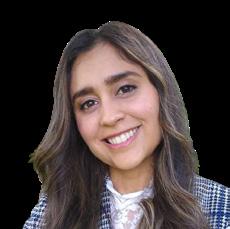
Ritcy Canelon, Esq., is an associate attorney of Tangel-Rodriguez & Associates, in child support enforcement matters. She has been a member of OCBA since 2021. FOLLOW US! @OCBAYLS #TogetherWeGoFar
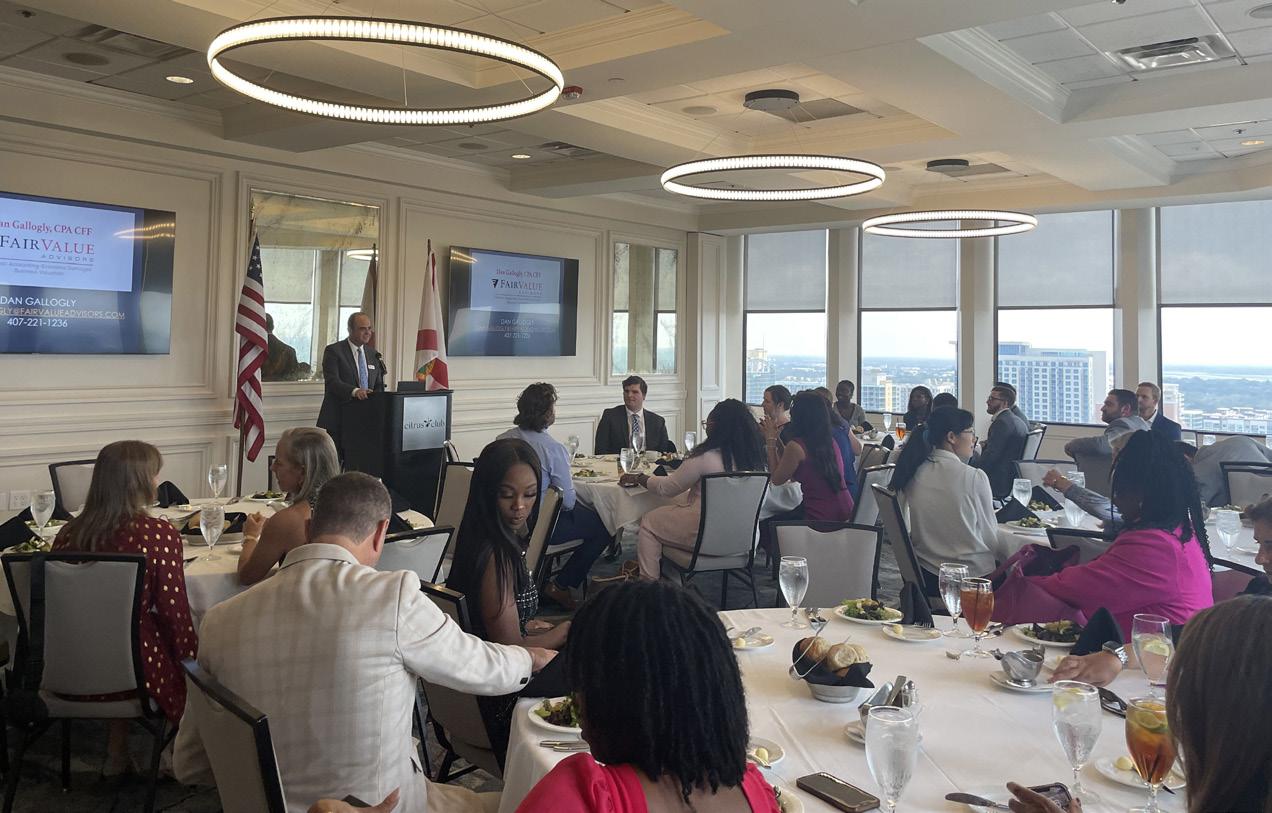
Finally, we in YLS would like to remind you that the Thanksgiving Food Drive with Basket Brigade is going on RIGHT NOW! This event aims to collect non-perishable food items for individuals in need at Thanksgiving. Don’t forget to grab a box (decorate it too!) and fill it with non-perishable foods! And after all that hard work, join us at the Thanksgiving Food Drive Happy Hour!
NOV 15, 2024 / Annual Golf Tournament at Eagle Creek Golf Club: The time is near! Enjoy a beau-teeful day of golf, sun, and raising funds for the Annual Golf Tournament. The 2024 Golf Tournament will be at the Eagle Creek Golf Club, located in beautiful Lake Nona. This year’s event’s promise to be a great one, no ifs, ands, or putts! Don’t forget to register online
or by emailing jacob@ ggrouplaw.com!
DEC 11, 2024 / Holiday Party at Dubsdread: The countdown for YLS’s annual Holiday party is on! YLS members, yule want to make sure to save the date for a party you’ll never fir-get. Tree-t yourself to a splendid time! More
information on registration to come!
STAY INFORMED:
To ensure you’re always up-to-date with YLS activities, please sign up for our weekly email blasts. Visit our website and click “Sign Up for YLS Emails.”
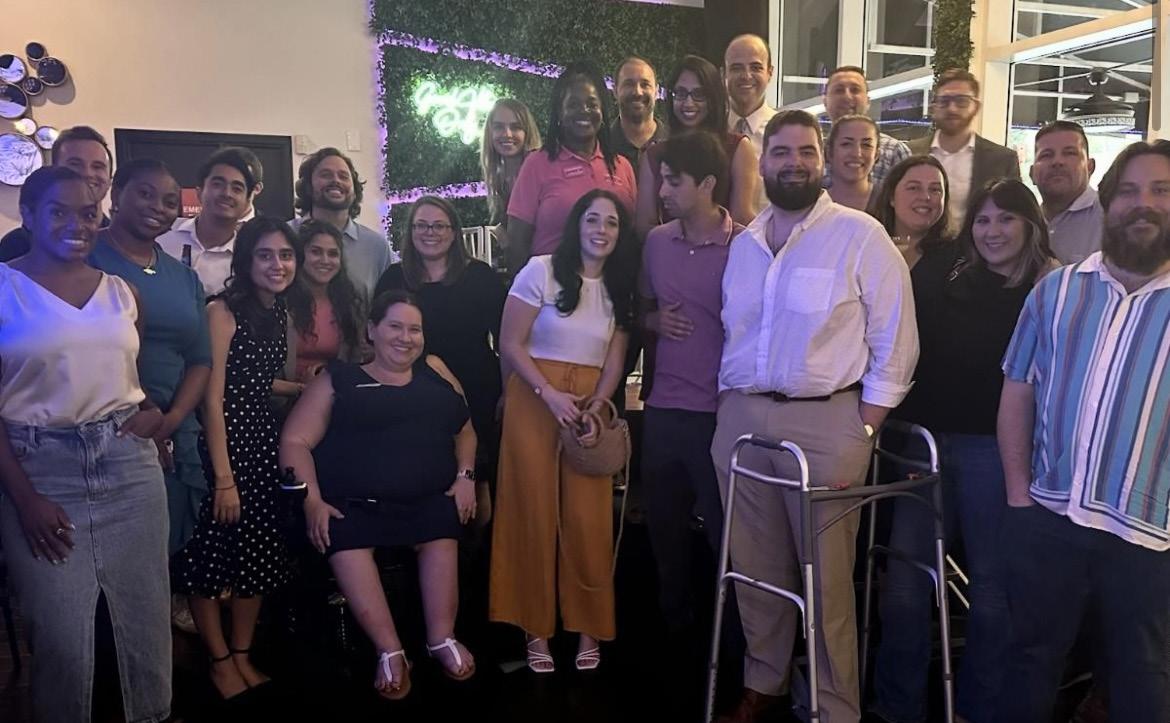
Firms with two or more attorneys who are all members can belong! If your firm is eligible, call the Membership Department (407-422-4551 x225)
20+ MEMBERS
Rumberger, Kirk & Caldwell
Shutts & Bowen
Wicker, Smith, O’Hara, et al.
Winderweedle, Haines, et al.
10-19 MEMBERS
Colling Gilbert Wright Fisher Rushmer
Marshall, Dennehey, Warner, Coleman & Goggin
McDonald Toole Wiggins
Stovash, Case & Tingley
2-9 MEMBERS
The Aikin Family Law Group
Anderson & Ferrin
The Arnold Law Group
Artemis Family Law
Aust Law Firm
Barrister Law Firm
Barry Miller Law
The Brennan Law Firm
Carr Law Firm
Compass Law
Culbertson Law Group
Davey Law Group
Debra Wilkinson Botwin
DeCiccio & Johnson
Dellecker Wilson King
McKenna Ruffier & Sos
Divine & Estes
The Draves Law Firm
The Elder Law Center of Kirson & Fuller
Fassett, Anthony & Taylor
Flammia Elder Law Firm
The Fighter Law Firm
Forward Law Firm
Gasdick Stanton Early
GoodBlatt – Leo
Green Family Law
Haliczer Pettis & Schwamm
Harris Harris
Bauerle Lopez
Hilyard, Bogan & Palmer
Hornsby Law
Infocus Family Law Firm
Jill S. Schwartz & Assocs.
Keating & Schlitt
King, Blackwell, Zehnder & Wermuth
Korshak & Assoc.
Kosto & Rotella
Law Offices of Brent C. Miller
Law Offices of Horwitz & Citro
Law Office of Michael L. Dear
Lebron Law
The Llabona Law Group
Marcus & Myers
The Marks Law Firm
McMichen, Cinami & Demps
McShane & McShane
Men’s Divorce Law Firm
Morgan, White-Davis & Martinez
Murphy & Berglund
N. Diane Holmes
O’Mara Law Group
Page & Eichenblatt
Perez LaSure
Rebecca L. Palmer
Law Group
Sawyer & Sawyer
Schwam-Wilcox & Assoc.
SeifertMiller
Shannin Law Firm
The Skambis Law Firm
Stovash, Case & Tingley
Tangel-Rodriguez & Assoc.
Warner & Warner
West Family Law Group
Wieland & DeLattre
Wilson McCoy
Wooten Kimbrough
Yergey & Yergey
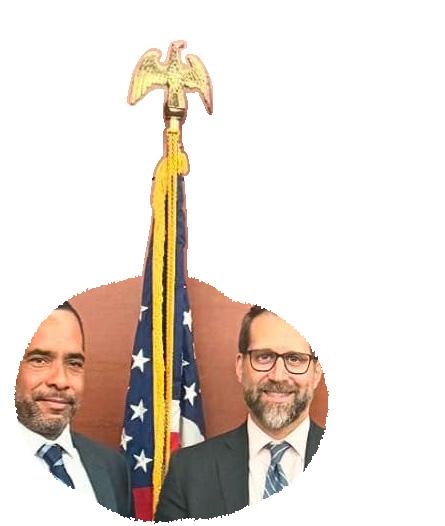
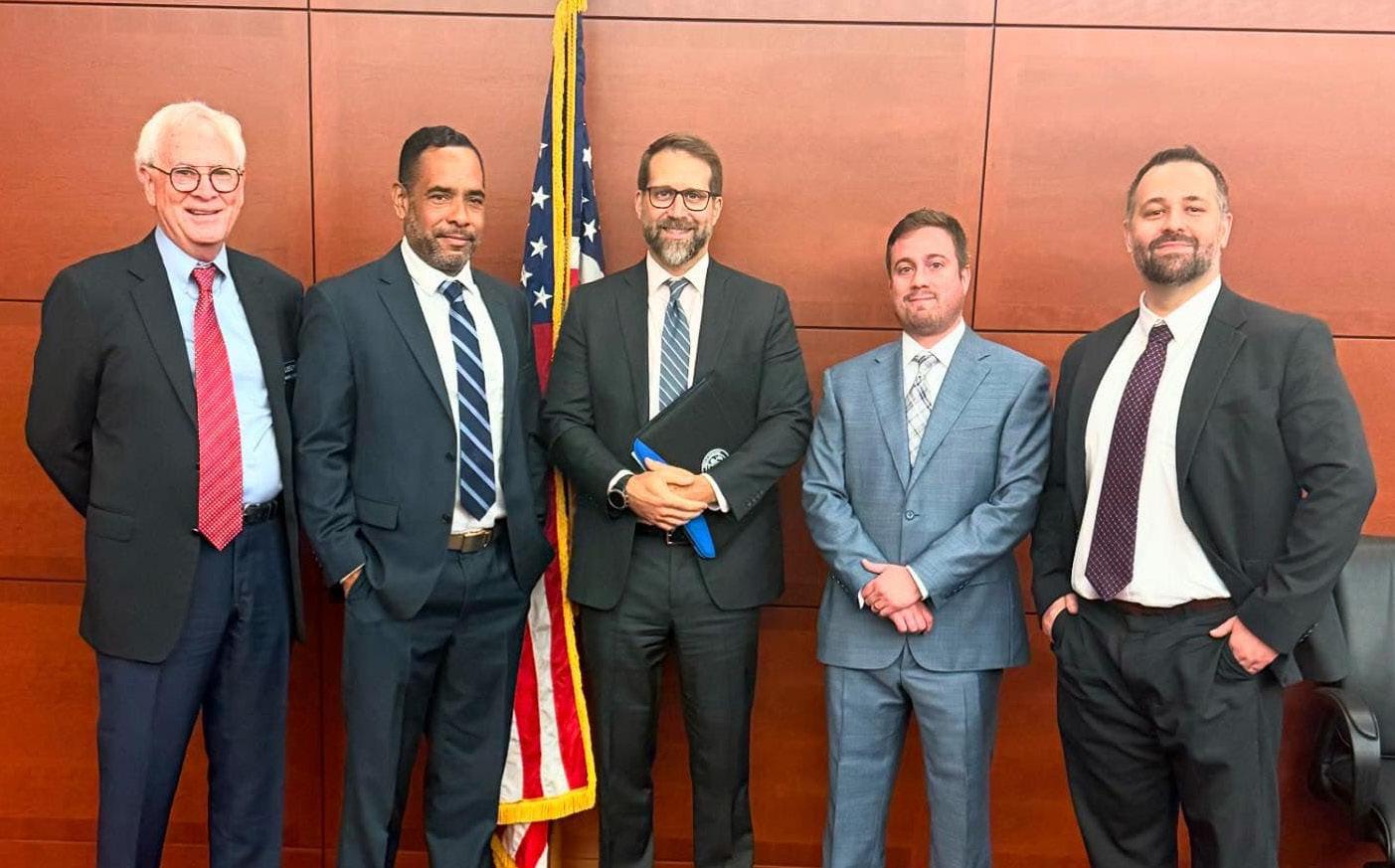
Federal Bar Association, Orlando Chapter
ON SEPTEMBER 24, 2024, the Federal Bar Association, Orlando Chapter, hosted their September luncheon and in person discussion on “Professionalism in the Age of Chat GPT- Challenges with Engaging new AI Tools in the Practice of Law.” This event featured U.S. District Judge Carlos Mendoza, U.S. Magistrate Judge Daniel Irick, and Ralph Losey. The event was moderated by Jesse Unruh and John Bennett.
Central Florida Association for Women Lawyers (CFAWL)
ON AUGUST 29, 2024, The Central Florida Association for Women Lawyers (CFAWL), hosted its first book club meeting via zoom.
ON SEPTEMBER 6, 2024, CFAWL hosted a luncheon at the Citrus Club featuring Assistant United States Attorney for the Middle District of Florida, Tiffany Cummins Nick.
ON SEPTEMBER 12, 2024, CFAWL hosted a virtual CLE titled “Malpractice Pitfalls of Very Good Lawyers”. This event was sponsored by Florida Lawyers Mutual Insurance and featured Margaret “Peggy” Hewitt.
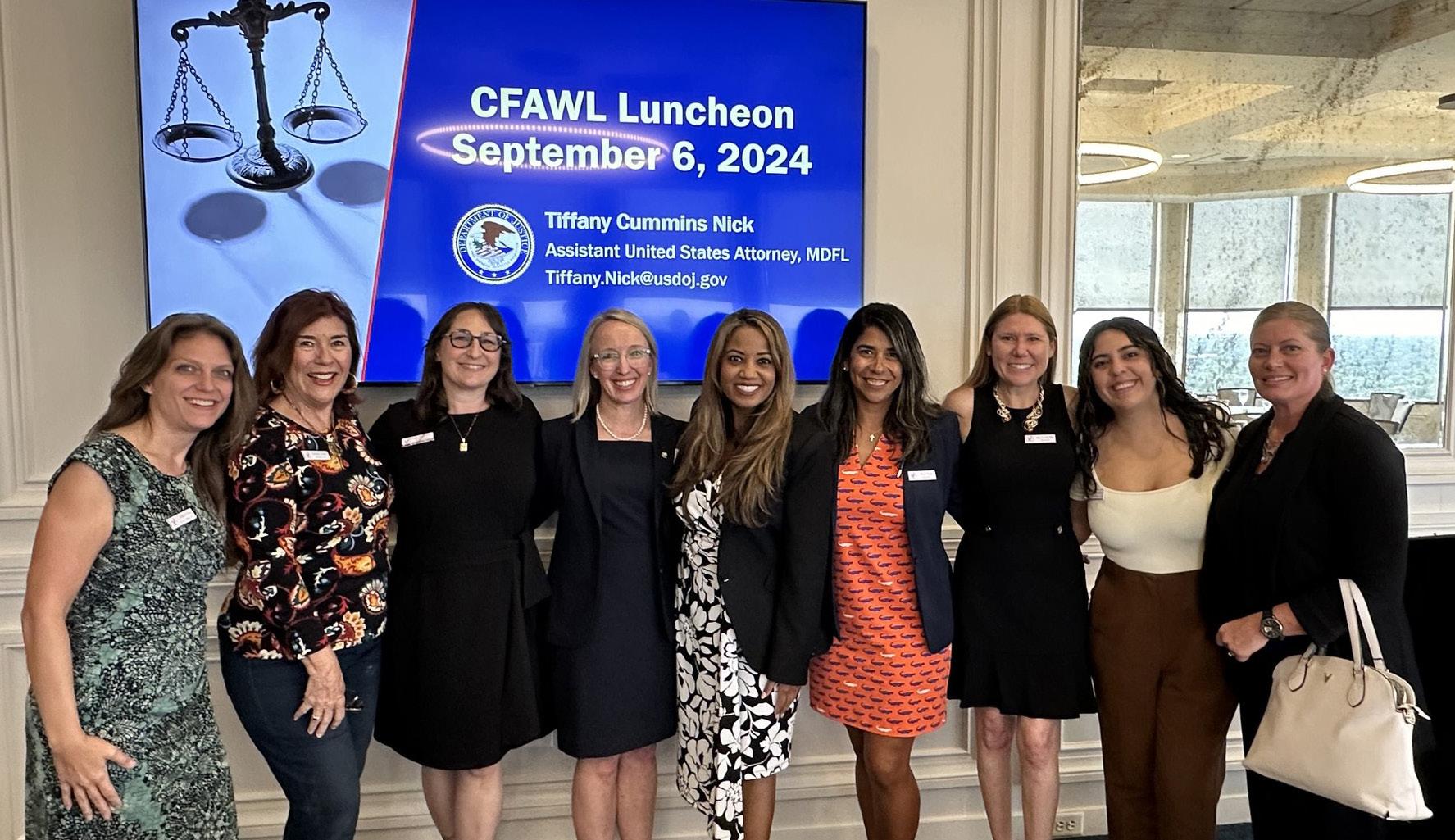
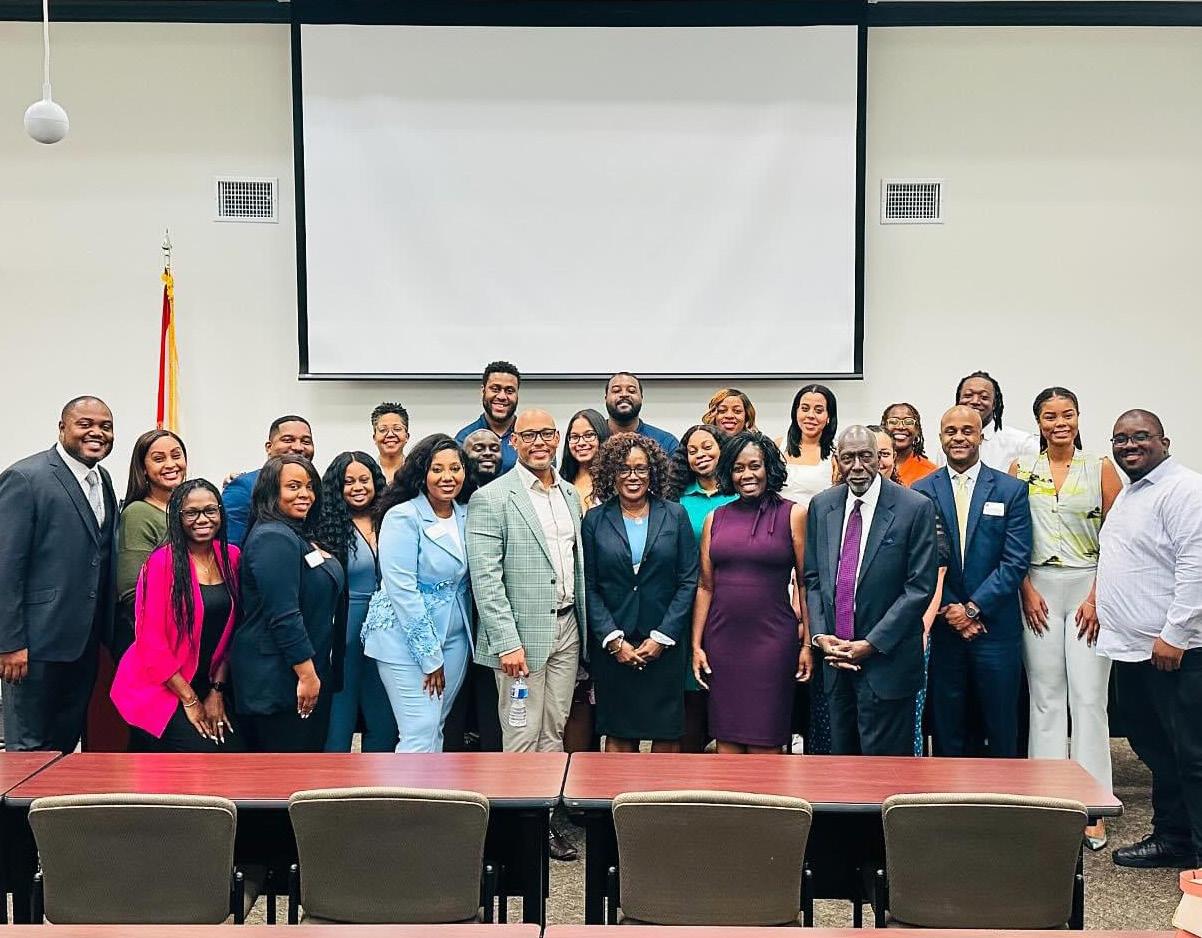
OCTOBER 2, 2024 / The Paul C. Perkins Bar Association held their second general meeting of the year featuring guest speakers: Conti Moore Smith and Ortavia Simon.
SEPTEMBER 5, 2024 / The Greater Orlando Asian American Bar Association hosted an evening of networking, drinks and light hors d’oeuvres with other Asian American and Pacific Islander business professionals at the Citrus Club.
AUGUST 19, 2024 / The Central Florida Family Law Inn welcomed new faces at their new member reception.
AUGUST 17, 2024 / The George C. Young American Inn of Court kicked off their new year with a welcome back bash at Wekiva Island.
1 Federal Bar Association, Orlando Chapter Luncheon featuring panelist speakers, U.S. Magistrate Judge Irick, U.S. District Judge Mendoza, Ralph Losey, and co-Moderators, Jesse Unruh and John Bennett.
2 Central Florida Association for Women Lawyers Luncheon
3 The Paul C. Perkins Bar Association First General Body Meeting
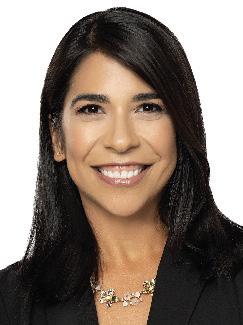
Alena V. Baker, Esq., of Alena Baker Criminal Defense, P.A., is a solo practitioner who practices primarily in the area of criminal law throughout Central Florida. She has been a member of the OCBA since 2011 and is a board member of the Criminal Law Committee of the OCBA.
